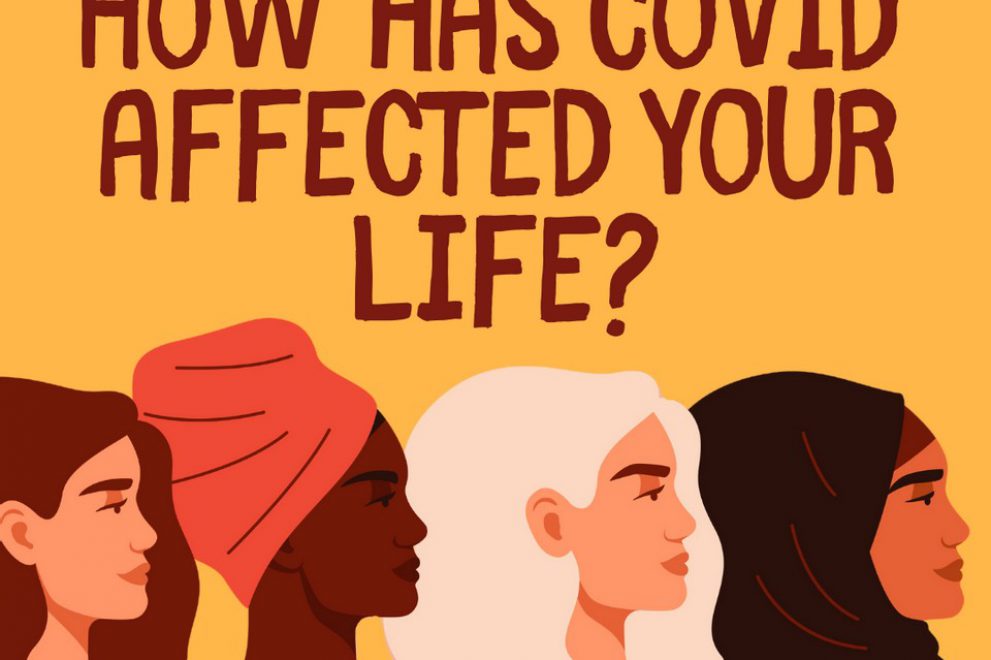Your cart is empty.


Your cart is empty.
This year, NAIDOC Week celebrates a big milestone — 50 years of honouring Aboriginal and Torres Strait Islander people, culture, and history.
NAIDOC began as a movement for justice and recognition, led by Aboriginal communities who imagined a fairer future. It has grown into a powerful national celebration of pride, showing the strength, leadership, and resilience of First Nations people across the country.
📍 Check out the events happening across Tarntanya / Adelaide and visit naidoc.org.au to learn more.
NAIDOC March and Family Festival (Free)
📅 Friday 11 July 2025
🕚 11am – 4pm
📍 Tarntanyangga (Victoria Square)
Church Service and Light Dinner (Free)
📅 Sunday 6 July 2025
🕕 6pm – 8pm
📍 Pilgrim Uniting Church, 12 Flinders Street, Adelaide
NAIDOC SA Awards
📅 Monday 7 July 2025
🕛 12pm – 2pm
📍 Adelaide Town Hall, 128 King William Street, Adelaide
NAIDOC SA Gala Ball
📅 Saturday 12 July 2025
🕡 6:30pm – 11:30pm
📍 Adelaide Convention Centre, North Terrace, Adelaide
👉 For the full event schedule and updates, visit naidocsa.com.au
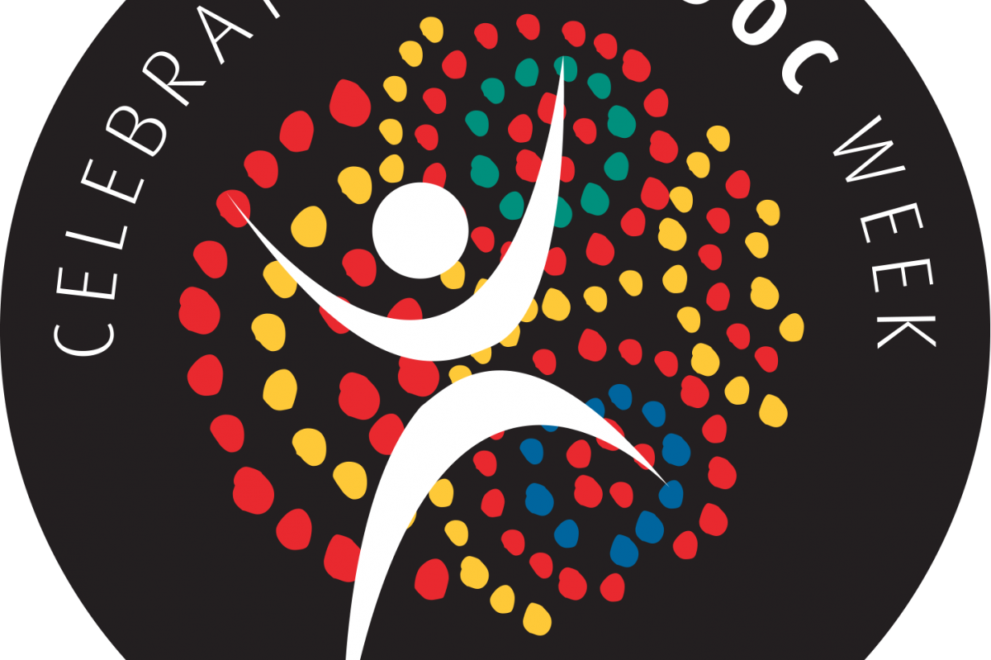

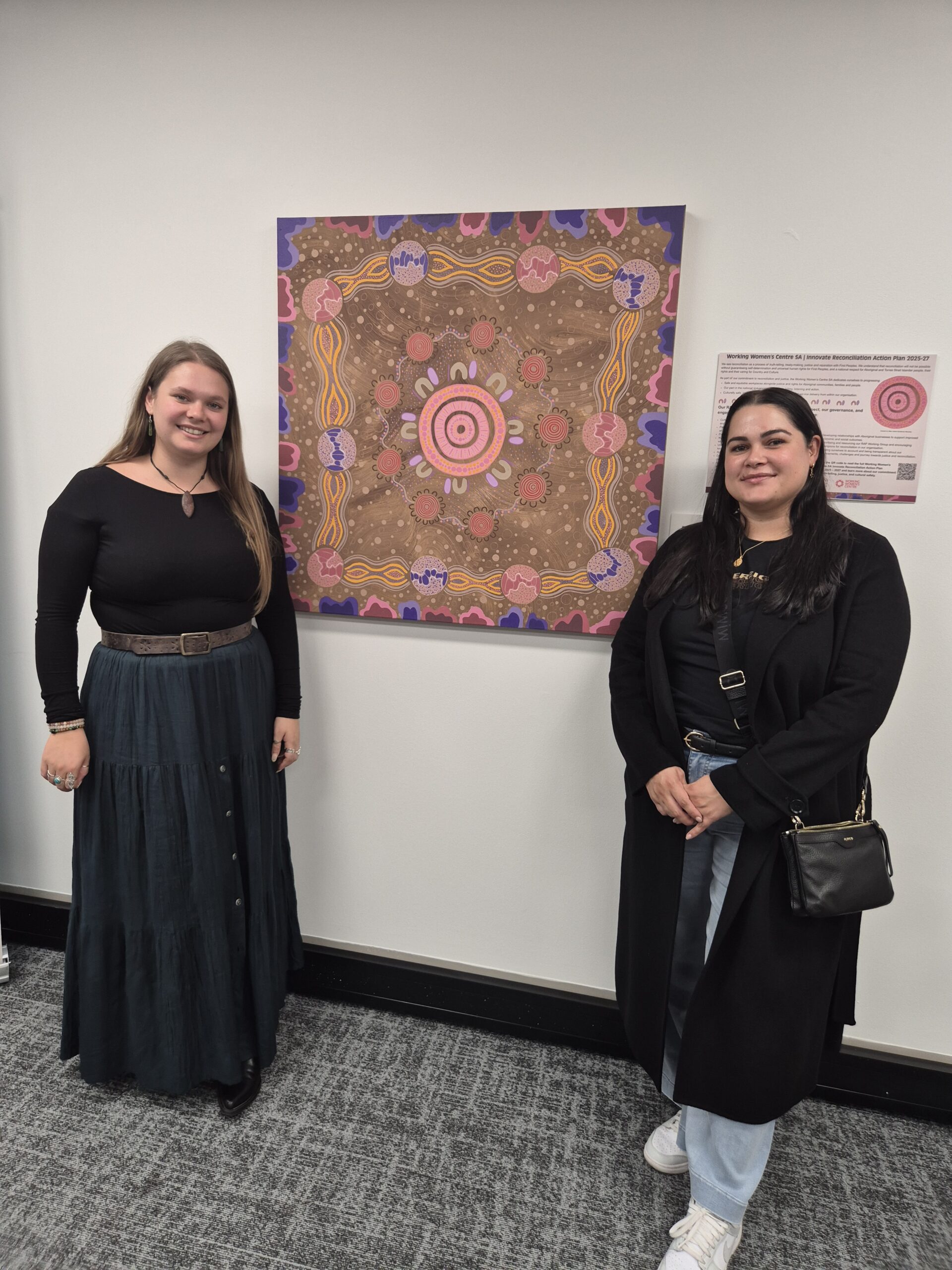
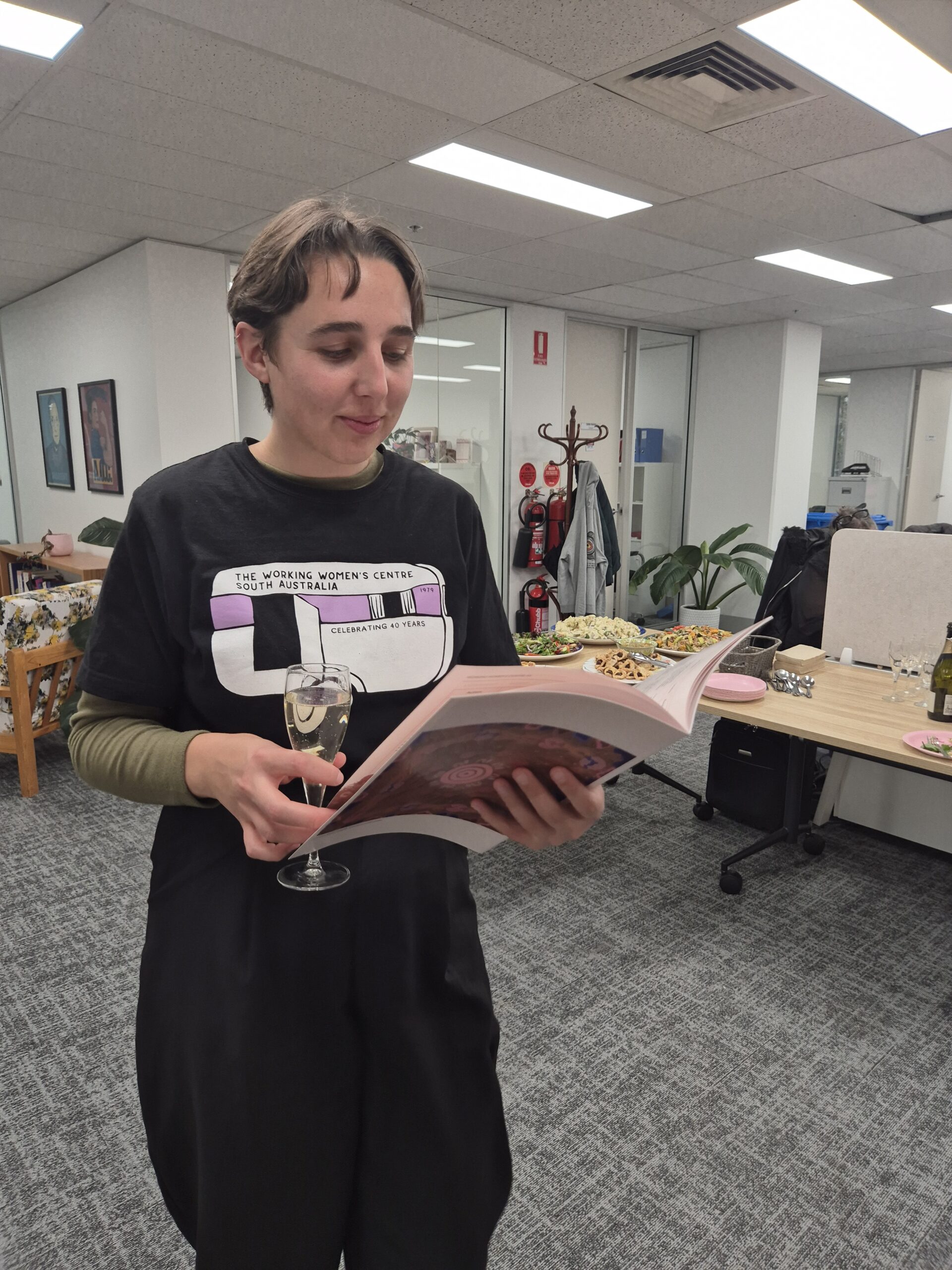
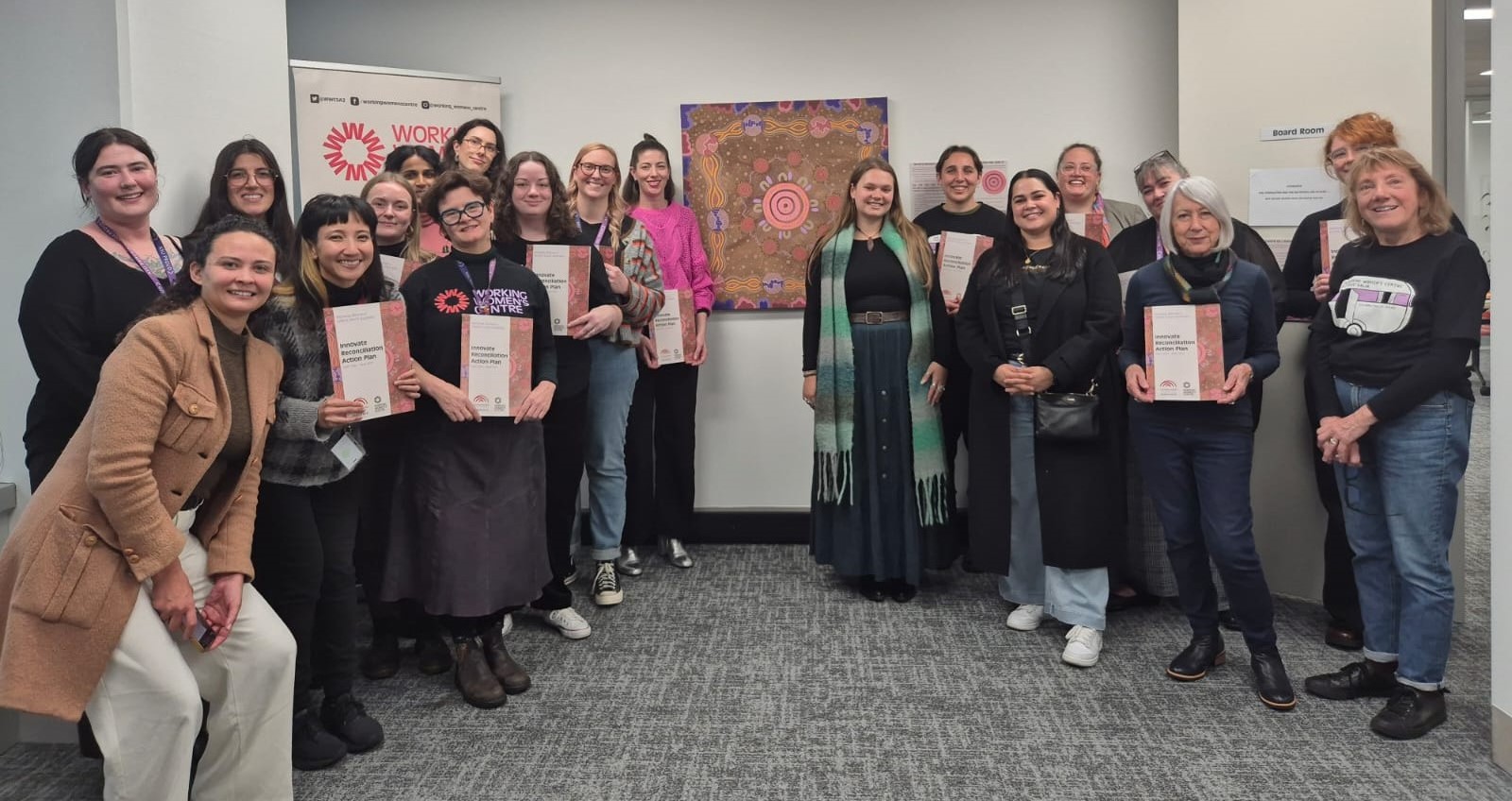
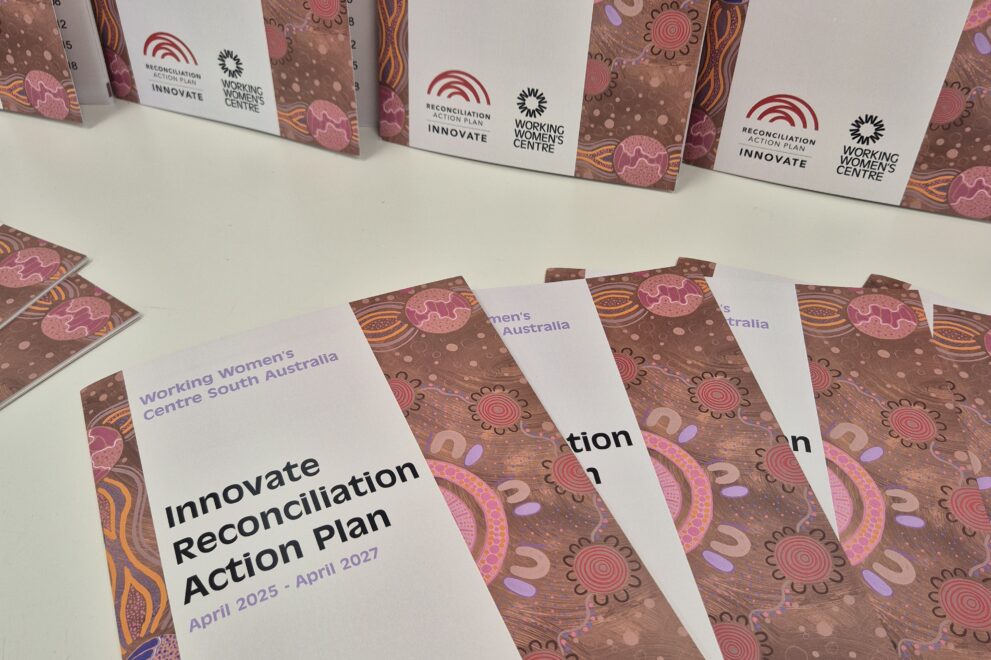
As part of this initiative, the AHRC has also developed a suite of resources to support workers, employers, and advocates in taking action.
👉 Explore the resources: https://lnkd.in/gHhBZxK6
👉 Read the full Speaking from Experience report here: https://loom.ly/SXRllfs
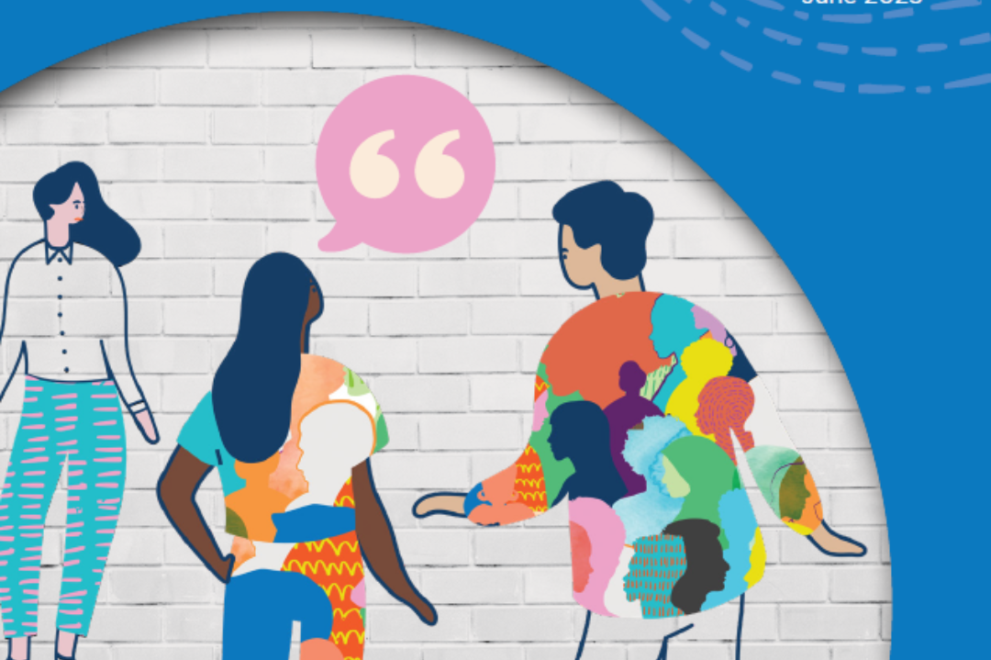
The Working Women’s Centre SA hit the road for four days, travelling to Port Augusta, Whyalla, and Port Pirie as part of our commitment to support vulnerable workers residing in regional South Australia about their rights at work.
We also provided free legal information to the community and connected with local organisations to strengthen referral pathways, build relationships, and better understand the needs of each region.
Our team engaged with hundreds of students, job seekers, teachers, and community members, sharing vital information about workplace rights, safe work environments, and how we support workers across regional South Australia.
We stopped in Port Augusta, where we were proud to be an exhibitor at the 2025 Career Roadshow hosted by UniHub Spencer Gulf. Education & Training Officer Maddie Diamond and Lawyer Dharani Rana were on hand to chat with students, career changers, and curious minds about their rights at work and the services we offer.
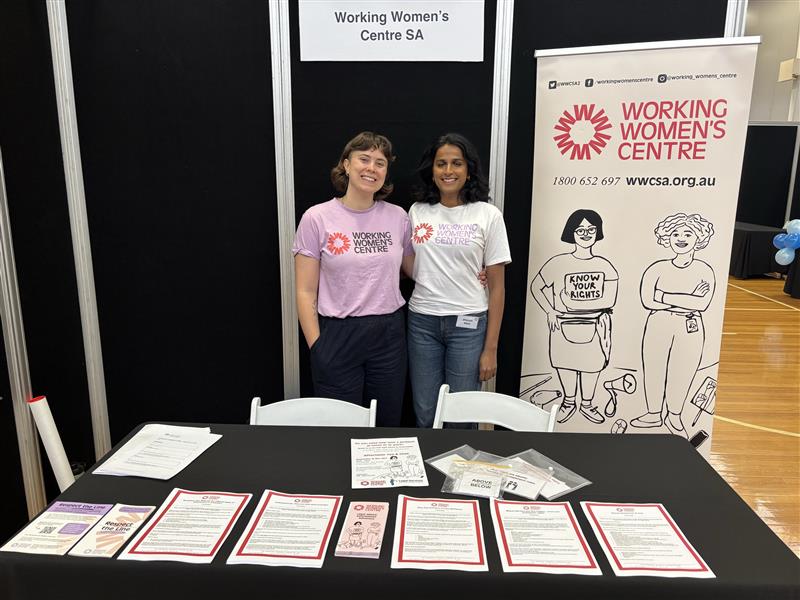
Our popular ‘Above the Line’ activity — helping participants identify workplace behaviours that are examples of sexual harassment — sparked meaningful conversations with young people and others who visited our stall.
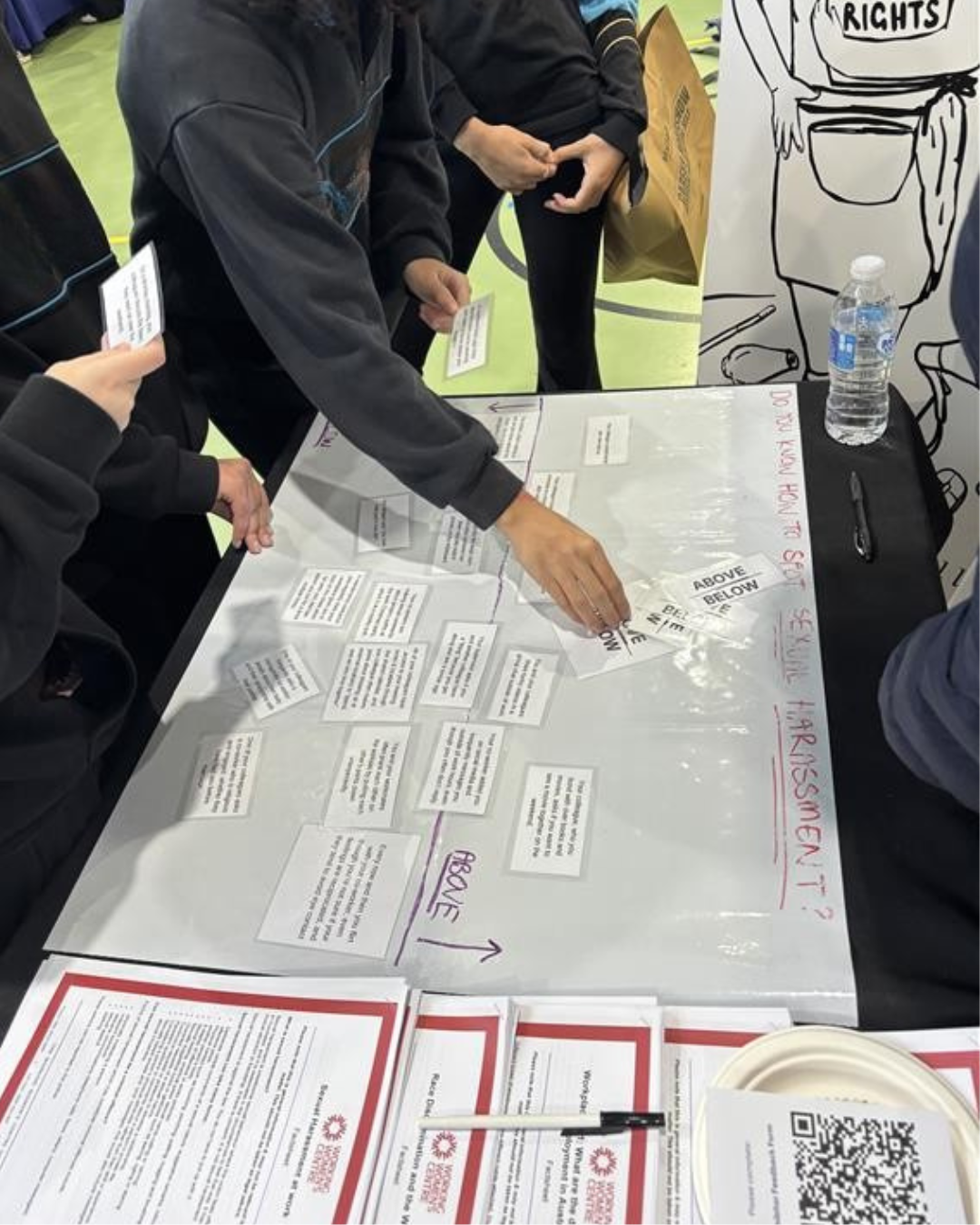
We teamed up with the Legal Services Commission for a community afternoon tea at TAFE SA Port Augusta. Locals were invited to drop in, grab a cuppa, and speak to our legal team about workplace rights, family law, domestic and family violence, child protection, and more.
We run these sessions to reduce barriers and provide clear and useful information through warm conversations.
The team also visited Whyalla, continuing the conversation at the local Career Roadshow, where we partnered with the Legal Services Commission. It was another fantastic day of engagement, where we spoke with students, workers, and community members about common workplace issues and how to seek help when things go wrong.
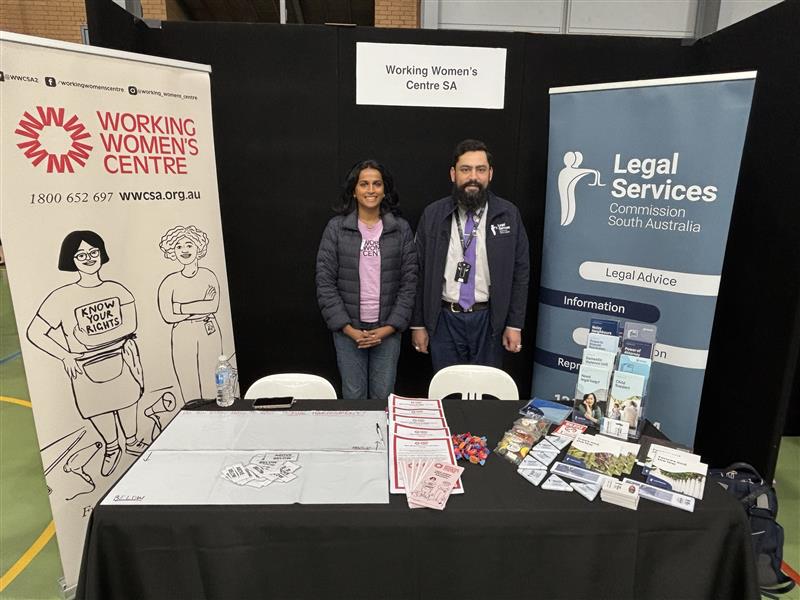
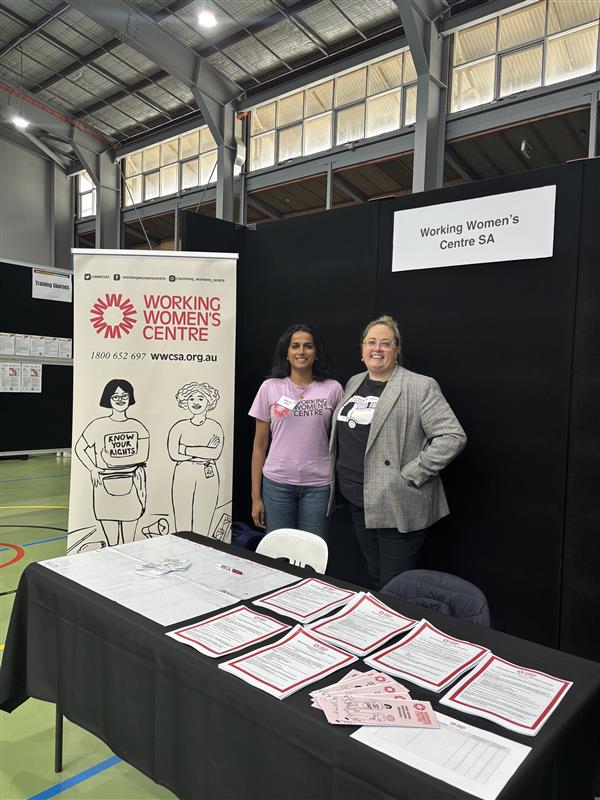
Our regional visit included meetings with the Port Augusta Council, Whyalla Council, The Haven Whyalla, Centacare, the Aboriginal Legal Rights Movement, the Australian Migrant Resource Centre, and the Whyalla Community Hub. In Port Pirie, our Director, Nikki Candy, and Principal Lawyer, Emma Johnson, connected with local services to share information about our programs and services.
On our way back to Adelaide, we wrapped up our trip with an interview on Umeewarra Radio, sharing how we support workers through free legal services and assist both workers and employers to create safer workplaces through our workplace training sessions.
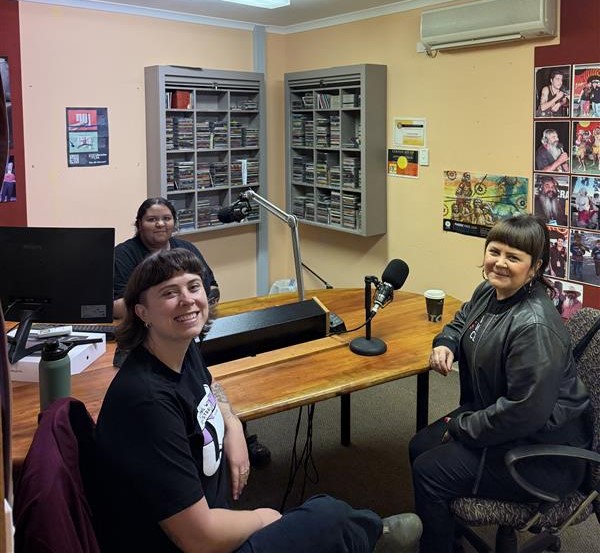
Why Regional Outreach Matters
Regional South Australians face unique challenges when it comes to accessing legal help and knowing their workplace rights. That’s why connecting directly with these communities is a key part of our work at the Working Women’s Centre SA.
If you or someone you know needs legal advice about work, we provide confidential, free legal support to eligible workers. Call (08) 8410 6499.
We also deliver Community Legal Education (CLE) —free presentations designed to assist students, workers, and community members better understand their workplace rights. To organise a CLE session or a speaker for your school, community group, or organisation, contact us at: reception@wwc.org.au
For employers we offer workplace education and training for small, medium, and large organisations across all industries, helping build respectful, safer workplaces. Get in touch with our Training and Education team to discuss your needs at training@wwc.org.au.
Want to stay updated on WWCSA news and where we’re heading next?
Sign up for our newsletter.
👋 We’re already looking forward to the next regional trip!
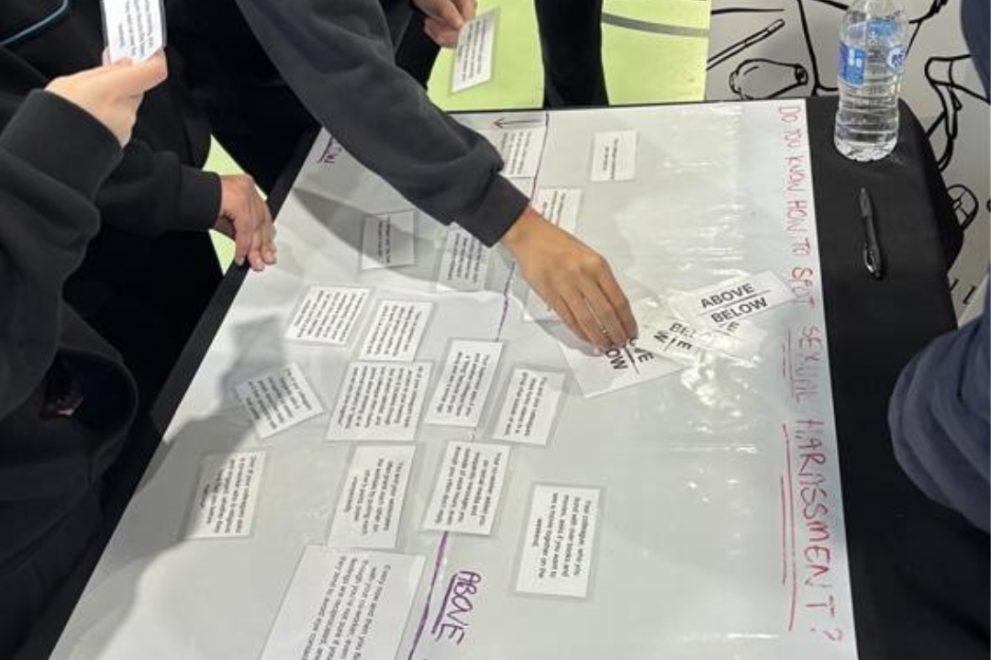
From 27 May to 3 June, Australians from all walks of life will mark National Reconciliation Week (NRW) — a time to learn about our shared history, reflect on our journey, and take meaningful action toward a fairer, more equitable future for Aboriginal and Torres Strait Islander peoples.
This year’s theme, “Bridging Now to Next,” invites us to reflect on where we’ve been, where we are, and where we need to go. It acknowledges the lessons of the past and challenges us to apply them in shaping a more respectful and united nation. It’s a call to every Australian to keep moving forward together.
Why these dates matter
NRW is always held from 27 May to 3 June to commemorate two key milestones in the reconciliation journey:
Together, these dates remind us of the power of collective action and the importance of truth, justice, and respect in shaping a better future.
About this year’s theme
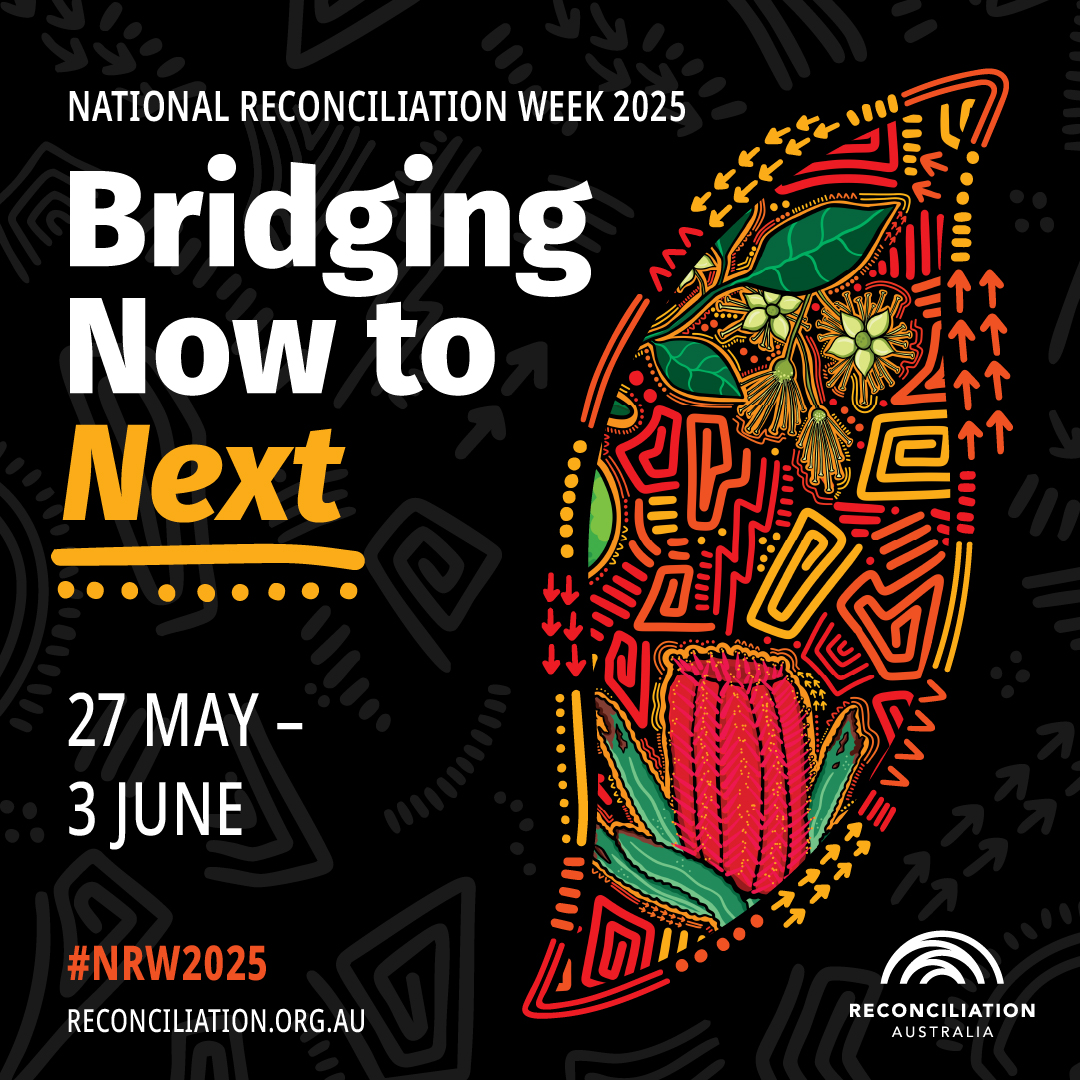
The 2025 theme — “Bridging Now to Next” — is brought to life by the artwork of proud Kalkadoon woman and digital artist Bree Buttenshaw. Her piece draws on the strength and resilience of native plants like Lemon Myrtle, Banksia and Kangaroo Paw — known for thriving after adversity — to symbolise regeneration, connection, and hope.
This theme is not just symbolic. It urges us to act: to honour the voices that came before us, to stand in solidarity with Aboriginal and Torres Strait Islander communities today, and to build a stronger, more just tomorrow.
How to get involved
National Reconciliation Week is for everyone. Whether you’re a school, workplace, or individual, there are many ways to participate:
Our commitment at the Working Women’s Centre SA
At the Working Women’s Centre SA, reconciliation is an essential part of our commitment to equity and justice. We honour the notion that Aboriginal matters require Aboriginal voices at the table and are pleased to inform that we are currently working in partnership with local Ngarrindjeri woman, Nicole Gollan of Nik&Co. Consultancy in the co-design of our inaugural Reconciliation Action Plan (RAP) — a framework that will guide our actions to build stronger relationships with Aboriginal and Torres Strait Islander peoples, ensure cultural safety in our workplace and services, and contribute meaningfully to reconciliation in South Australia.
We look forward to sharing our RAP with you soon, and continuing this important journey — together.
For more information about Reconciliation Week, visit reconciliation.org.au and stay tuned for updates on our Reconciliation Action Plan.
#NRW2025 #BridgingNowtoNext #ReconciliationWeek
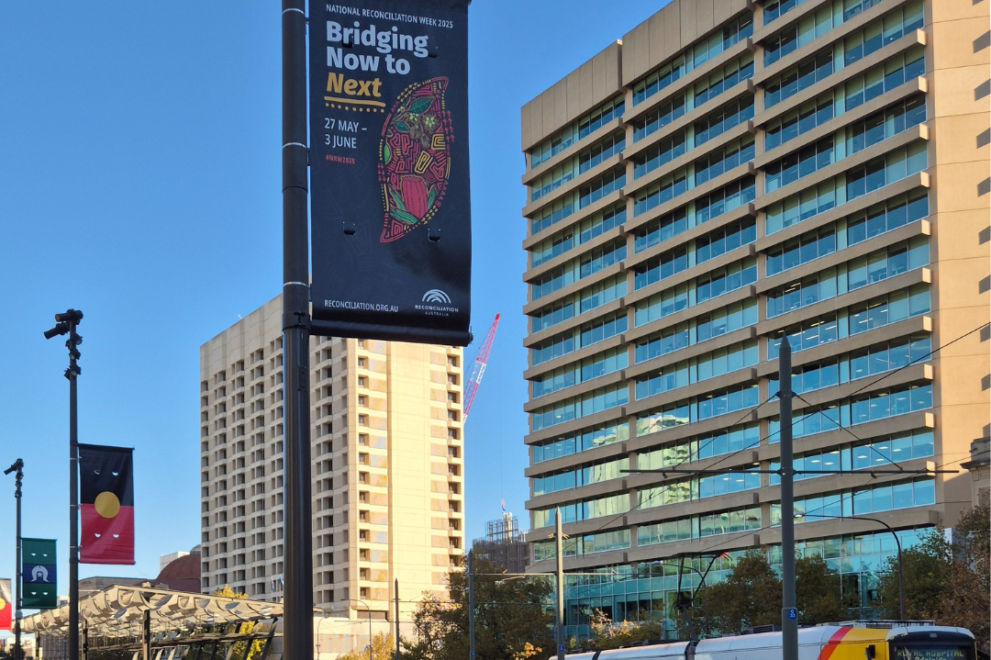
Abelita and Etelvina were in Australia for a two-week leadership and learning journey across Melbourne and Adelaide, as part of the Anna Stewart Memorial Project (ASMP) — a program that brings union women together to grow leadership, build solidarity, and strengthen the movement.
Their visit was made possible through our ongoing partnership with Union Aid Abroad – APHEDA, and it’s a reflection of the strong and deep-rooted bonds between Australian unions and our Timorese neighbours.
As part of their journey, Abelita and Etelvina took part in an intensive week of ASMP training with SA Unions. They explored the role of women in the union movement, connected with Australian labour history, and joined workshops on leadership and advocacy. They also spent time doing hands-on placements with local unions to see how worker advocacy plays out in real life.
When they visited us at WWCSA, we spent a full day learning from each other. Some of the highlights included:

Our connection with the Working Women’s Centre Timor-Leste goes way back. It all started in 2008 when Elisabeth Lino De Araujo — now WWCTL’s Country Manager — joined the ASMP and did her placement right here at WWCSA. That experience helped plant the seed for WWCTL, which today supports women workers across Timor-Leste, especially domestic workers who’ve long been excluded from formal labour protections.
It was an honour to spend time with Abelita and Etelvina. Their visit wasn’t just about learning — it was a beautiful expression of international solidarity. These connections strengthen the global movement of women pushing for fair, safe, and respectful workplaces.
To Mana Abelita and Mana Etelvina — Obrigada. Thank you for your courage, your stories, and your vision. This is just one chapter in a much bigger story of solidarity, sisterhood, and the ongoing fight for workers’ rights around the world.
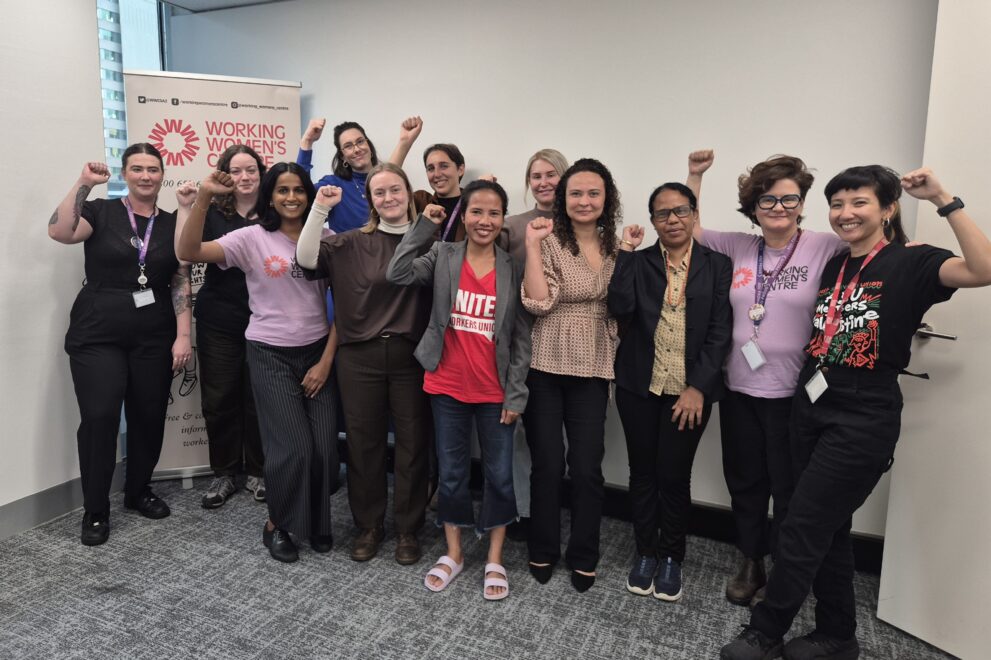
For many workers, particularly women, workplace sexual harassment is a deeply harmful psychosocial hazard. Its impacts are long-lasting, affecting mental health, job satisfaction, and overall wellbeing. But the impact goes beyond the harassment itself.
The widespread use of Non-Disclosure Agreements (NDAs) in workplace sexual harassment cases continues to undermine safety by silencing victim-survivors and protecting perpetrators. Often presented as a standard condition for resolving such claims, these legal contracts can ultimately cause more harm than good.
A Non-Disclosure Agreement (NDA) is a legal contract that requires someone to keep certain information confidential. In workplace sexual harassment cases, NDAs are often used to prevent victim-survivors from speaking about what happened to them—sometimes indefinitely.
While NDAs are presented as standard legal tools to protect privacy and finalise settlements, in practice, they are often misused, shielding employers and perpetrators while isolating victim-survivors. Many workers feel they have no real choice but to sign an NDA to resolve their complaint, secure a settlement, and protect their career.
One in three workers in Australia has experienced sexual harassment in the workplace in the last five years—41% of women, 26% of men, and 67% of non-binary people.[1] This is not a marginal issue. It is Australia’s most widespread workplace safety concern.
Sexual harassment is driven by outdated gender stereotypes and entrenched power imbalances. It happens across all sectors, to people of all ages and backgrounds, and it’s overwhelmingly perpetrated by men (77%). [2]
Workplace sexual harassment causes deep psychological harm. Victim-survivors often experience:[3]
When NDAs prevent people from speaking about their experiences, these harms are exacerbated—isolating workers, inhibiting accountability, and making it harder to heal.
At the Working Women’s Centre SA, we see first-hand the long-term impacts of workplace sexual harassment and NDAs on the careers and lives of workers.
Workplaces have a Positive Duty under the law to proactively prevent sexual harassment—not just respond after harm is done. The routine use of NDAs undermines efforts to create a safe, transparent workplaces.
We are calling on the South Australian Government to restrict and regulate the use of NDAs in workplace sexual harassment matters. NDAs should never be the default.
They should only be used when requested by the victim-survivor, without coercion, and with access to independent legal advice.
NDA reform would:
The Working Women’s Centre SA is campaigning to end the misuse of NDAs and ensure that workers can access justice, healing and the freedom to tell their stories.
[1] [2][3]Source: Time for respect: Fifth national survey on sexual harassment in Australian workplaces, Australian Human Rights Commission, 2022.

Join us to march together on International Women’s Day for safety, equality and respect, in our workplaces, communities and families.
IWD is a day for working women and all who fight for justice and equality. Come and say hi to the Working Women’s Centre crew at the march!
On Saturday 8th March we’ll ‘March Forward’ starting at Tarntanyangga (Victoria Square – North End) at 10:30am.
The Welcome to Country will be by Aunty Elaine Magias, a proud Kaurna & Narungga woman and inspiring educator. We’ll then hear from the following speakers:
As we go marching, marching … we’ll march together north to the mall and then to Mukata (Hindmarsh Square) and close the march.
Come and say hello to the Working Women’s Centre crew (look for our t-shirts). We’ve got some shiny new badges to distribute with the message ‘Our silence is not for sale’.
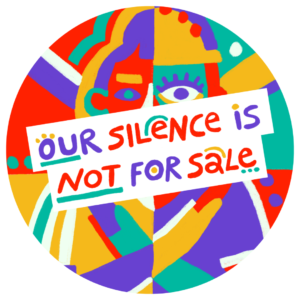
We’re calling for law reform to end the misuse of Non-Disclosure Agreements (NDAs), so people can tell their story, on their terms. We can make workplaces safer by making sure workers aren’t forced to sign NDAs when they make a complaint about sexual harassment they’ve experienced.
The ‘Our silence is not for sale’ artwork is by artist Nicky Minus. You can check out her amazing work at the Gallery 3 Workers Art Collective.
Find details and accessibility information about the IWD march here. We can’t wait to see you there!
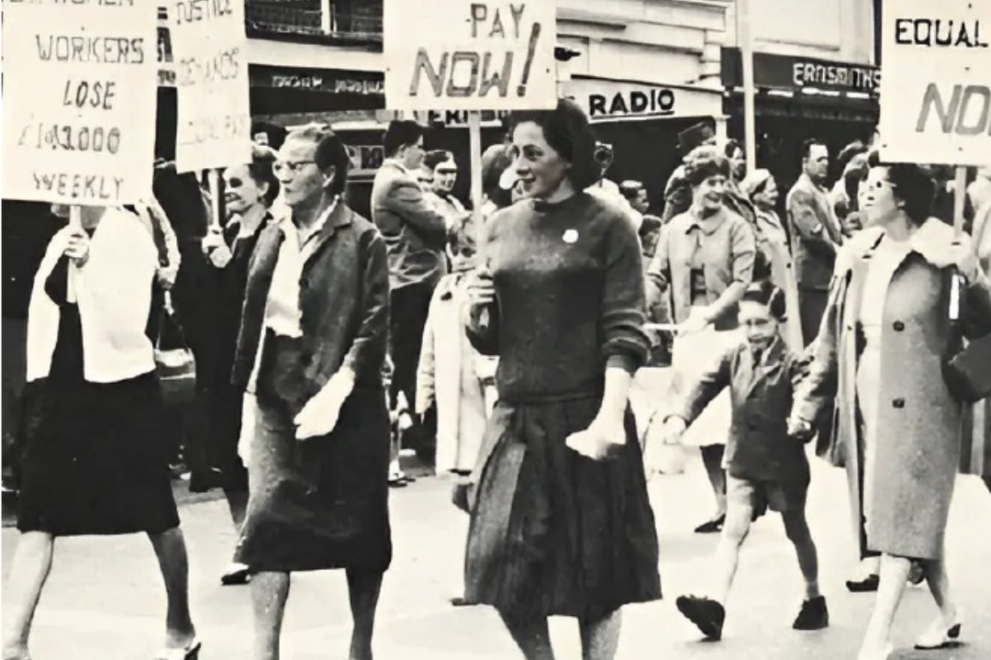
Every year, the international campaign known as 16 Days of Activism Against Gender-Based Violence calls for action against one of the world’s most persistent violations of human rights – violence against women.
#16Days is held from 25 November (International Day for the Elimination of Violence against Women) to 10 December (International Human Rights Day).
This year, Working Women’s Centre SA are highlighting ways that you can help raise awareness and involvement in action to end gendered-based violence in its many forms.
16 actions you can take during #16Days and throughout the year:
We know it can be overwhelming to witness and act against the levels of violence in our world – however your actions do help make a difference.
To help you with where to begin, we’ve also shared below some more information about 16 different aspects of gender-based violence, and the organisations and campaigns that are responding and making change. Join, speak up, donate and be active!
1/ Understanding and Changing Violence Against Women in Australia
Gender-based violence is a national emergency in Australia, and women are calling for action.
The South Australian Government is currently undertaking a Royal Commission into Domestic, Family and Sexual Violence. As part of the process, they are seeking submissions from the public – these are due by 5pm Tuesday 10 December 2024.
Alongside government, community, family and workplace action, organisations like Australia’s National Research Organisation for Women’s Safety conduct feminist research to help us to understand violence against women, and national advocacy agencies like Our Watch work to embed change.
2/ Working for Truth, Treaty, Justice
The Working Women’s Centre SA supports truth-telling and treaty-making, for our nation to truly come to terms with the ongoing violence of colonialism. Aboriginal and Torres Strait Islander women are important leaders in feminist and workers movements, and solidarity with First Nations Peoples’ calls for reparation and justice can be shown in many ways.
Non-Indigenous feminists can follow platforms like Indigenous-X and their Anthology, listen to First Nations feminist voices, and support Aboriginal community -controlled activism.
3/ Supporting Peace and Internationalism- End the Genocide in Palestine
War, settler colonialism and militarism go hand in hand with gender-based violence. Women and children are targeted in conflicts and crises, and wars significantly increase rates of sexual and gender-based violence. The United Nations has reported that 70% of people killed in Palestine in the last year have been women and children.
Feminists work for justice and peace! Find out more through the Women’s International League for Peace and Freedom and Australian Friends of Palestine Association.
4/ Acting for Climate Justice
The climate change emergency disproportionately impacts on women and children, and subjects many people to food insecurity, displacement and disaster. Elevating women’s rights will always positively impact on better climate action, adaptation and justice.
Find out more about feminist action for climate justice globally. In Australia, support activist organisations like Seed Mob.
5/ Defending Our Abortion Rights
From Trump’s America to attempts to restrict abortion in various states of Australia, abortion rights are back on the political agenda and reproductive rights are under attack. No one is free from violence if they can’t control their own bodily autonomy.
“Why we [heart] abortion and use the phrase pro-abortion” is a great piece from Texas. Here in SA join, donate and get active with the South Australian Abortion Action Coalition.
6/ Supporting Women in Prisons
Intergenerational violence and poverty contribute to the criminalisation and incarceration of women and girls. Gender-based violence can be a pathway to incarceration, and racism and trauma means that First Nations women are over-represented in jails.
Justice Action represents people locked in Australian prisons and hospitals, defending human rights in the hardest places. Seeds of Affinity – Pathways for Women (Seeds) is a South Australian organisation that is run by and for women with lived prison experience.
Sisters Inside and other organisations like them are a voice for and by incarcerated women.
7/ Supporting Trans Rights
Violence and discrimination against trans and gender diverse people is increasing around the world. Everyone is responsible for making sure people are safe to live their own lives and are supported in their bodily and healthcare choices.
Trans Equality is a movement of trans and gender diverse people, allies and organisations, working for trans rights, advocacy and connections in Australia. Minus18 works to champion and celebrate LGBTQIA+ young people.
8/ Supporting Disability Rights
Women, girls, and gender diverse people living with disability experience high levels of violence and abuse in their homes, health and care settings, workplaces, and in the community. They are demanding justice and rights, not paternalism.
Women With Disabilities Australia works to promote human rights and end all systemic discrimination and violence based on gender and disability.
9/ Supporting the Rights of Sex Workers
Sex workers are workers, deserving of safety and workplace rights as much as any other worker. The criminalisation and stigmatisation of sex workers can have devastating effects on their safety, housing, health and wellbeing. Supporting the rights and decriminalisation of sex workers is a feminist issue.
Scarlet Alliance, Australian Sex Workers Association, and in South Australia, the Sex Industry Network undertake self-determined activism to advance the rights, respect for and health of sex workers.
10/ Supporting Refugee Rights
The human rights and freedom of refugees and migrants are one of the biggest issues facing humanity, worsening with climate crisis and war. Refugees and asylum seekers have spoken up about how Australia has of some of the most cruel and violent policies targeting them in the world, and are leading the movement for positive change.
Like many issues, the best work for change is grounded in the principle of “Nothing About Us, Without Us”. Support self-determined activism and mutual aid by donating to RISE: Refugees, Survivors and ex-Detainees.
11/ Anti- Poverty Action
The gender wage and superannuation gap, unpaid caring labour, taxation and social security policies all contribute to women’s experiences of poverty in Australia. Family, domestic and sexual violence, and poverty, are often closely interconnected.
Check out the Raise the Rate campaign and support the work of the Anti-Poverty Network SA, a voice for South Australians on low incomes.
12/ Responding to Modern Slavery and Labour Trafficking
Modern slavery and labour trafficking is a global epidemic affecting industries such as textiles and fashion, agriculture and food services, domestic services, technology and construction. Over 70% of people forced into labour are women or girls.
Responses need to be led by rights-based, pro-union and sex worker inclusionary feminism such as the Global Alliance Against Trafficking in Women. In Australia, organisations like Action Aid are campaigning for economic justice for women workers around the world.
13/ Elevating the Rights of Children and Girls
One in three girls can expect to be the target of some form of gender-based violence during their lifetime. Children are affected by global challenges such education, health, bodily rights, and disaster relief.
The Global Fund for Women believes that children’s rights must be addressed, and that girls, young women and non-binary youth must be included in the fight for gender justice. Plan International’s 2023 State of the World’s Girls report focused on girls’ and young women’s activism.
14/ Being Union Proud!
The union movement continues its proud tradition of fighting for women’s rights, from equal pay to paid Family and Domestic Violence Leave. Unions are playing an important role in combatting workplace sexual harassment.
Join your union, celebrate women in unions and keep up the fight!
15/ Combatting Sexual Harassment in the Workplace
One in three people have been sexually harassed at work. Following its groundbreaking inquiry, report and recommendations, Respect@Work offer a comprehensive set of resources to understand, prevent and address workplace sexual harassment, including new Positive Duty laws that require employers and businesses to actively eliminate sexual discrimination and harassment.
However, the silencing effects of Non-Disclosure Agreements are still discouraging reporting and action. This needs to change. Working Women’s Centres around the nation are working to change the misuse and overuse of NDAs. Stay in touch with us to be part of this campaign and remember we also offer workplace training on sexual harassment and family and domestic Violence.
16/ Advancing Human Rights Laws in Australia and South Australia
A Human Rights Act, nationally and in South Australia, would help prevent discrimination and injustice, and promote rights, dignity and democracy. The South Australian Parliament is currently in the committee stage of considering human rights legislation.
Human Rights Acts or Charters would empower women and others to act when their rights are violated. The Working Women’s Centre SA supports the campaign for an Australian Human Rights Act.

On 1 December 2023 the Working Women’s Centre SA hosted an event at Tadouni College in Port Adelaide on domestic servitude with keynote speakers Associate Professor Natalie Harkin and Elisabeth Lino de Araujo.
The event was attended by Kaurna, Ngarrindjeri, and Narungga Elders and activists, government officials, representatives of Aboriginal health, academics, union officials, APHEDA members, the Hon. Mira El Dannawi MLC, the Hon Steph Key, the Hon. Tammy Franks MCL and the Commissioner for Equal Opportunity, Jodeen Carney.
We received apologies from the Hon. Kyam Maher, Attorney General, the first Aboriginal Attorney-General in South Australia, as well as Minister for Aboriginal Affairs and Minister for Industrial Relations and the Public Sector. We also received apologies from the Hon. Katrine Hildyard MP, Minister for Women and the Hon. Natalie Cook MP, Minister for Human Services.
Associate Professor Natalie Harkin and Elisabeth Lino de Araujo shared their expertise, research and poetry on domestic servitude and advocacy of marginalised women. This event was an excellent demonstration of solidarity between Aboriginal and Timor Leste women as it presented the similarities between historical domestic servitude within our State, which makes up an under spoken element of Australia’s history, and domestic servitude that occurring in other parts of the world today, such as in Timor-Leste.
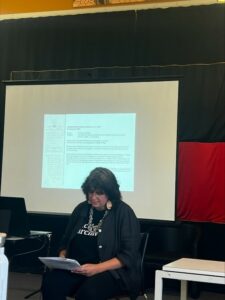
Associate Professor Natalie Harkin
Elisabeth Lino de Araujo is the founder of the Working Women’s Centre Timor-Leste (WWCTL) in Dili, Timor-Leste. From 2007 Elisabeth has worked as the Country Manager of Union Aid Abroad – APHEDA Timor Leste. Elizabeth presented on the incredible work that the WWCTL does, with a focus on advocacy for domestic and vulnerable female workers both in reaction to exploitation but in prevention. The Labour Code of Timor Leste was ratified by the Timorese Government in 2010, and the WWCTL has an outreach training workshop where they educate women on their rights at work in accordance with this legislation. We also heard Elisabeth present on another example of the fantastic advocacy of the WWCTL, on the proposed Special Law for Domestic Workers Bill in Timor Leste, which was drafted in 2017, and is awaiting promulgation. It was inspiring to hear about the WWCTL’s steadfast contribution to the formation of this Bill.
Associate Professor Natalie Harkin is a Narungga poet and Research Fellow at Flinders University living on Kaurna Yerta, South Australia. She engages archival-poetic methods to document community Memory Stories and is a member of SA’s inaugural State Records/State Library Aboriginal Reference Group. Her research centres on Aboriginal women’s domestic service and labour histories, and Indigenous Living-Legacy / Memory Story archiving innovations for our time.
Associate Professor Harkin presented on her research on historical domestic servitude of Aboriginal women and resulting stolen wages, of which the government in South Australia is yet to address. Further, she discussed the barriers in place for Aboriginal people to access their records through the State Archive today. An important underpinning theme of her work is the importance of the decolonisation of our state archives.
Leadlight artist and Narungga woman Sharene Vandenbroak kindly allowed the Working Women’s Centre SA to display her stain glass artwork at this event. Her artwork entitled ‘See Her Shining in the Sun’ was featured in the larger exhibition ‘APRON-SORROW / SOVEREIGN -TEA’ in 2021. Sharene’s set of gorgeous handmade stain glass windows depicting her strong female family members performing domestic labour received much praise and enhanced the story telling atmosphere of this event.
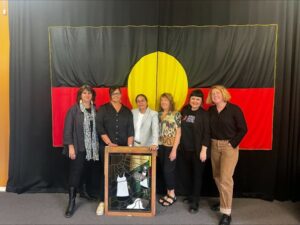
(Left to right) Associate Professor Natalie Harkin, Sharene Vandenbroak, Elisabeth Lino de Araujo, Anne-Marie Hayes, Nikki Candy, Abbey Kendall
Stolen Wages Work
The Working Women’s Centre SA organised this event as a result of meeting with multiple Aboriginal women and hearing their stories of work from the late 1950’s to late 1960’s. In acknowledgement of South Australia’s under recognised history of exploitation of Aboriginal workers, the WWC has been assisting several Aboriginal women to gain access to their records held in archives by the state government.
The racially motivated policies that existed in South Australia up until the 1970’s facilitated control and exploitation of Aboriginal workers. Resultingly, it was common for Aboriginal workers to not be paid, or to be paid small, intermittent amounts of money for the work they performed. The types of work that were common for Aboriginal workers to perform historically were domestic and pastoral work. The WWC is funded to provide legal advice to women and vulnerable workers, and in line with our funding, domestic servitude is feminised work. In a recent submission from the WWC to the state government on the proposal for South Australia to form a Human Rights Act, the WWC submitted to the inquiry that Aboriginal people should have the right to have timely access to records that relate to them. A copy of the WWC’s submission can be found here.
The WWC has been working with Associate Professor Natalie Harkin in advocating for archive accessibility and assisting Aboriginal women to request their own government records relating to their historical employment. This is often a lengthy process with multiple bureaucratic obstacles, which creates further barriers for Aboriginal people to access their own records relating to themselves and their families.
The WWC strongly supports and endorses the decolonisation of state records. Ensuring that Aboriginal people have timely and effortless access to their own records is an essential and crucial step towards truth telling and reconciliation of South Australia’s history of exploiting Aboriginal workers.
Other states and territories in Australia such as QLD, NT, NSW, WA and the NT have addressed historical stolen wages that occurred within their jurisdictions. South Australia is yet to address this issue.
The Working Women’s Centre SA would like to thank all who attended this highly successful event, and to further send a special thanks to both Elizabeth and Associate Professor Natalie Harkin for sharing their expertise. We look forward to continuing this collaboration and advocacy on these important issues with both Elizabeth and Associate Professor Natalie in the future.
The 16 June marks International Day of the Domestic Worker. You can read about Domestic Workers, here. We look forward to platforming domestic workers and both their historic and current rights in the coming year.
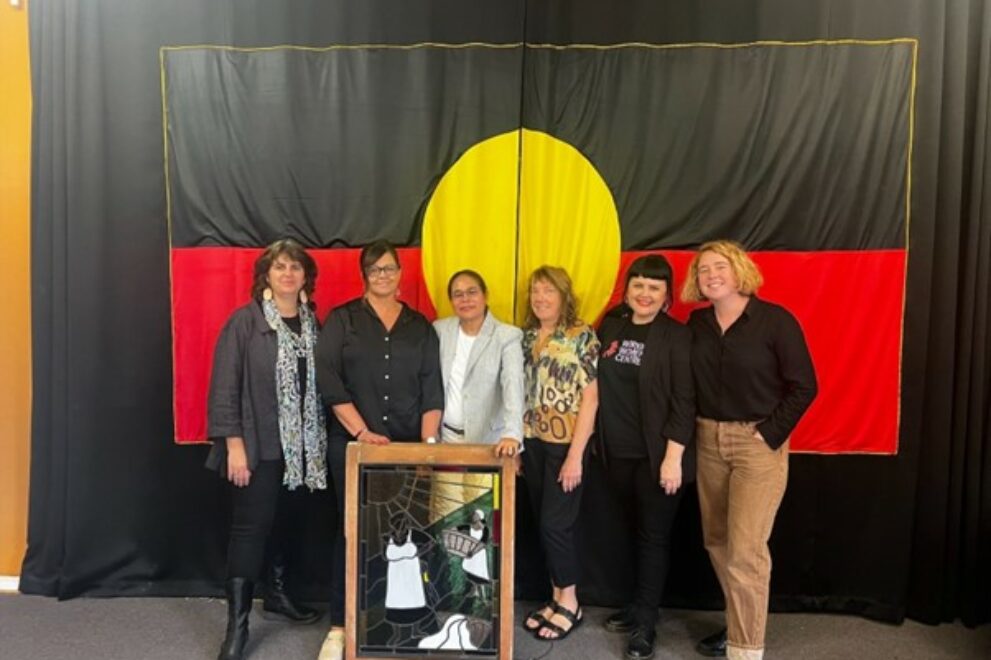
We are hosting 2 consultation workshops, to better understand the experiences and needs of young SA LGBTQIA+ women and non-binary workers, across a wide range of industries and roles.
ONLINE: Wednesday 3 May 12pm-1:30pm (ACST).
FACE TO FACE: Wednesday 10 May 5:30pm-7pm (ACST), at DiverseCity, 116 Grote Street, Adelaide.
The information gathered from these two sessions will be used to guide the development of a LGBTQIA+ workers support training program for HR managers, to be advertised at a later date. Participants of the workers’ consultations will be thanked for their contributions with a $50 gift card.
If you think your experiences could provide us with insight into how workplaces can be improved to support LGBTQIA+ women and non-binary people, and you are interested in attending, let us know! Fill out our registration form to let us know a bit about yourself and why you’re keen to get involved. We will be in touch if you have secured a spot!

You will have the opportunity to get free and confidential legal advice in relation to a wide range of workplace issues including wages and conditions, dismissals and sexual harassment. We will also discuss union membership and connect you with your union.
We have appointments available on:
Appointments will be conducted in person at SA Unions or via the phone. Clients can choose to attend in person or participate by telephone.
To book an appointment call: (08) 8410 6499 or you can make an online inquiry here:
https://wwcsa.org.au/enquiry-form/
Any details that you provide will be kept confidential and we do not make contact with your employer without your consent.
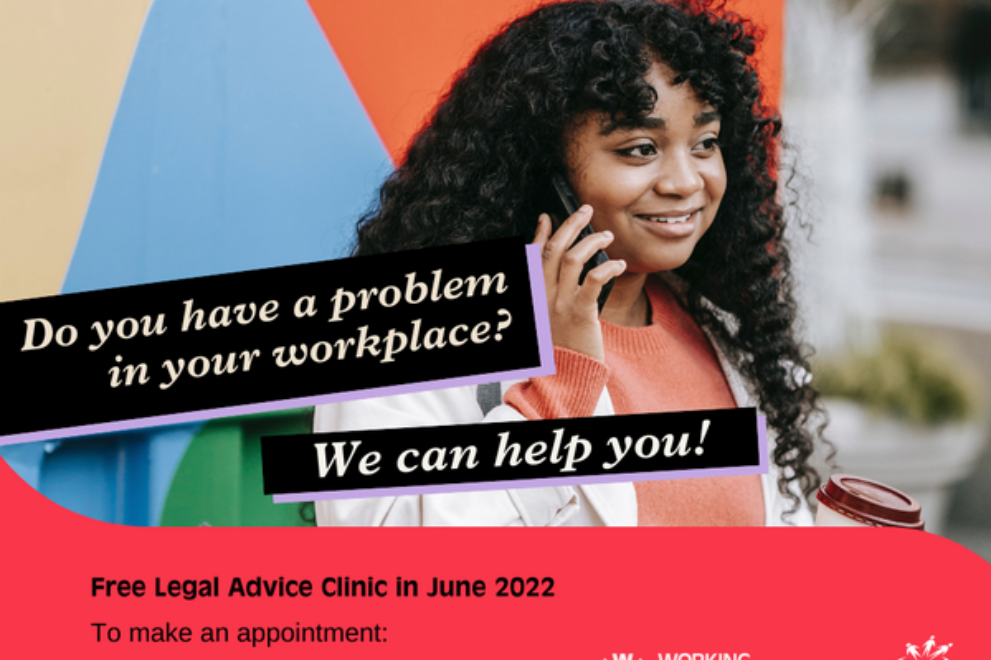
The Senior Advocacy Officer is responsible to the Director. The role will require supervision of junior advocacy officers and volunteers to the Centre. The role will require the Senior Advocacy Officer to lead, in conjunction with the Director, campaigns, advocacy and fundraising projects that relate to the Centre’s objectives. Presently the Centre is engaged in advocacy and campaigning projects on the following issues:
The Senior Advocacy officer will be responsible (under the supervision of the Director) for the precarious work and sexual violence project and share collective responsibility for the other campaigns and advocacy projects. The Senior Advocacy Officer will also be expected to work with the Director to attract funding for the Centre and supervise fundraising activities.
In this role, every week will look different as you take on a diverse range of tasks as part of a small organisation. You will lead a team of energetic volunteers and drive advocacy projects to improve working conditions for women and vulnerable workers. You will work as part of a supportive and collaborative staff team to make a difference.
Any experience you have in event management, communications, campaigning, organising, fundraising, strategy or education would be useful for this role. Basic digital skills in programs such as WordPress, Canva and Zoom would be of use.
We know that sometimes the best people for the role may not fit the exact selection criteria.
To discuss this role, please contact Abbey Kendall, Director of the Working Women’s Centre SA on (08) 8410 6499.
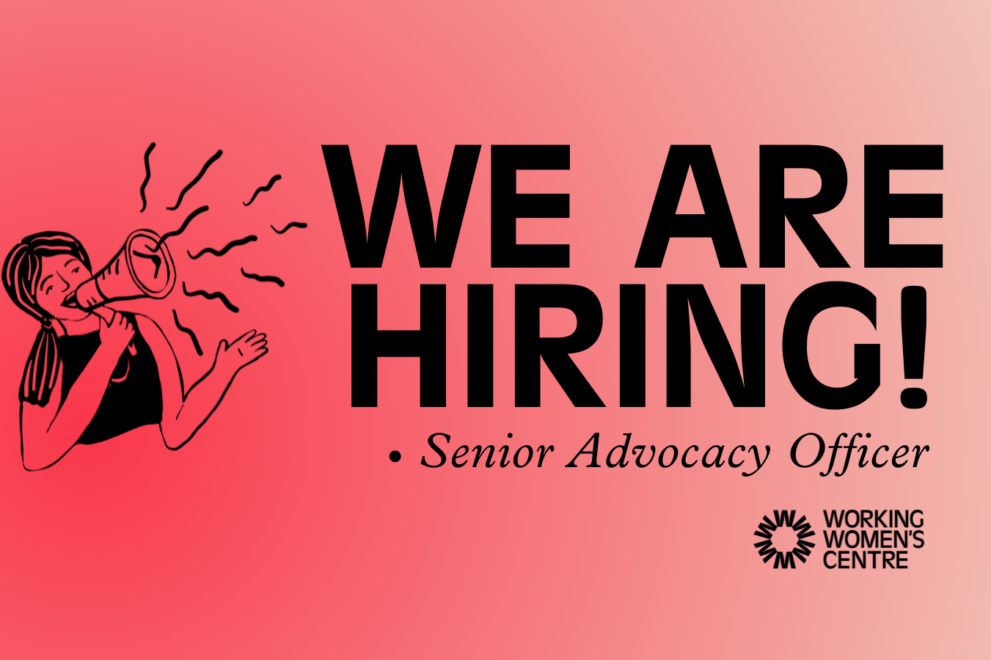
WHEN
14 Oct 2021
4.00-6.00pm
EVENT TYPE
Workshop
WHERE
The Working Women’s Centre SA, Level 1 Station Arcade, 52 Hindley Street
ACCESSIBILITY
The venue is wheelchair accessible. The nearest disability access bathrooms are at the Adelaide Train Station.
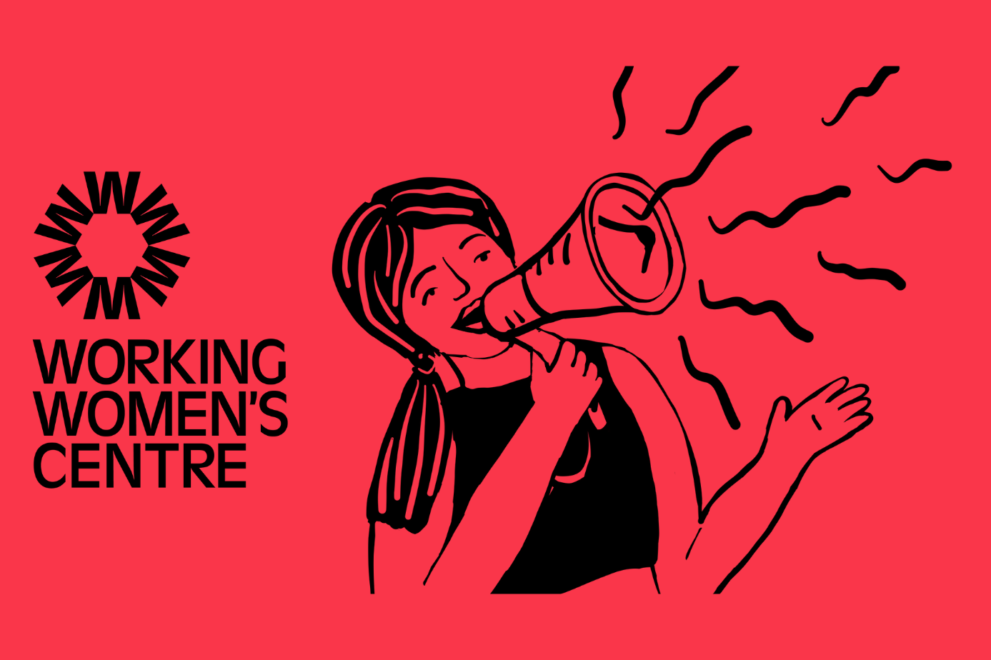
In the wake of the Women’s Safety Summit, leaders of key sexual harassment support services in South Australia, Queensland and Northern Territory express disappointment at the government’s empty words about the need for holistic approaches to prevent violence against women. Working Women’s Centres are specialist women’s services which provide holistic advice, information and support for women experiencing workplace sexual harassment.
Despite the Morrison government’s emphasis at the Women’s Safety Summit on the importance of holistic community services, the Government made no commitment to implement Recommendation 49 of the Respect@Work Report and fund Working Women’s Centres as a standalone funding line.
Recommendation 49 of the Australian Human Rights Commission’s Report states ‘[that] Australian governments provide increased and recurrent funding to Working Women’s Centres to provide information, advice, and assistance to vulnerable workers who experience sexual harassment.’ The Sex Discrimination Commissioner, Kate Jenkins, recognised the unique holistic support provided by Working Women’s Centres: “We found they were uniquely the most effective, victim-centric model that could deliver support, advice [and] advocacy to women [across a] range of issues in their work.”
Despite this strong recommendation from the Sex Discrimination Commissioner, the Federal Government has continued to ignore Recommendation 49 and the suite of recommendations put forward in the Respect@Work Report. Recommendations required to drive the necessary cultural shift towards providing safer workplaces and societies for female citizens, and for some of its most vulnerable members.
Last month, Working Women’s Centre directors again wrote to the Federal Attorney-General Michaelia Cash asking for an update as to the progress of prospective funding under Recommendation 49. In a letter from the Attorney-General received on the eve of the Summit Roundtable discussions, the Federal Government stated it has done its part funding Recommendation 53 in relation to legal services and recommended that Working Women’s Centres compete for this money.
While some Working Women’s Centres may be eligible to apply for funding out of a general allocation for legal services, not all Working Women’s Centres are legal centres. Working Women’s Centres are uniquely valuable due to their holistic approach, focus on prevention and advocacy work. Legal services are one part of the solution and the Attorney-General’s response fails to recognise the unique role that Working Women’s Centres play in the workplace landscape. By ignoring Recommendation 49, and instead asking Working Women’s Centres to fight it out for a portion of the funding allocated for legal services, the Morrison government has failed working women who rely on Working Women’s Centres’ services.
Last week, Labor announced that if elected, the party would fund Working Women’s Centres around the country. While the Coalition government has accepted Recommendation 49, the recommendation has not yet been implemented by the government, along with many other recommendations which remain ignored.
With the NT Working Women’s Centre just months away from closing, Working Women’s Centres leaders are calling for immediate funding for the NT and Queensland Working Women’s Centres, and for a bipartisan commitment to fully fund Working Women’s Centres around the country.
Quotes attributable to Nicki Petrou, Director NT Working Women’s Centre:
“It was made clear at the Safety Summit that local based services were best placed to respond to the unique need in their own backyards, and yet this is not new to those on the ground. Instead, we have seen cherry picking and unilateral funding commitments without discussions with the states or territories as to what is required, without an understanding as to what is happening on the ground, who is providing what, what is the need.
The NT Working Women’s Centre will continue to operate until the end of the year- that is all we can say at this stage without funding security.
We do not want to see Territory women the casualties of a political funding battle especially when every minute counts for us right now. The Federal Government’s response feels like a huge cop out, after stringing us along for months…especially when they know our situation.”
“The need for this funding is urgent: there has been a national outcry against workplace sexual harassment and assault that we know occurs in every industry. We cannot delay this. The NTWWC do not want to start turning women away especially when as a society we are now encouraging women to come forward and share their story, to say enough is enough but not provide the support that is needed when it is needed.”
Quote attributable to Abbey Kendall, Director of SA Working Women’s Centre
“We have been fighting for funding recognition for the last 8 months and we welcome Labor’s pledge to sustainably fund Working Women’s Centres and ensure that all Australian women can have access to our world leading model of service, no matter where they work and live. Sexual harassment in the workplace should not be politicised.
“We need funding action from the Federal Government and bi-partisan support for our services. This is a no-brainer, the Federal Government have an opportunity to make their mark in the prevention of sexual harassment, and they can do it by funding a holistic, professional and trauma informed service that has a proven track record of improving the lives of Australian working women.”
Quotes attributable to Claire Moore, Acting Director of Basic Rights Queensland (Working Women’s QLD)
“Working Women’s Centres have proven our worth over many years. We support women to understand their rights and have access to the system to achieve outcomes when these rights have been violated. The struggle for effective funding has highlighted the unmet needs of women and the impact on their lives, their workplaces, and their families. The Respect@Work report acknowledged the need for these services as an integral element of the response to the systemic damage to women who are damaged by harassment, discrimination, and isolation. Their voices need to be heard.”
Save our Working Women’s Centres website:
https://saveourworkingwomenscentres.com.au/
The South Australian, Northern Territory, and Queensland Working Women’s Centres welcome Labor’s promise to ensure there are properly funded Working Women’s Centres in every Australian state and territory.
With this announcement, Labor has recognised that Working Women’s Centre’s service models are crucial to addressing the pervasive issue of sexual harassment in Australian workplaces.
All corners of the country are calling on the federal government to address sexual harassment in the workplace.
Recommendation 49 of the Australian Human Rights Commission’s Respect@Work Report is that ‘Australian governments provide increased and recurrent funding to working women’s centres to provide information, advice, and assistance to vulnerable workers who experience sexual harassment. The Sex Discrimination Commissioner recognised the unique holistic support provided by Working Women’s Centres:
“We found they were uniquely the most effective, victim-centric model that could deliver support, advice [and] advocacy to women [across a] range of issues in their work.”
The federal government accepted this recommendation. Now is the time for the government to make a concrete funding announcement.
Working Women’s Centres call for bipartisan commitment to fully fund Working Women’s Centres. The prevention of sexual harassment should not be a political football. We need the federal government to immediately announce a funding package for the working women’s centres. The Northern Territory Working Women’s Centre is just months away from closing.
Two out of five Australian women experienced sexual harassment at work in the past five years, but the Federal Government has failed to properly fund the Working Women’s Centres that provide the first point of contact for women experiencing sexual harassment in the workplace.
All three centres have seen an exponential increase in enquiries about sexual harassment. The South Australian Working Women’s Centre has seen a 200% increase in enquiries since March 2021.
Quotes attributable to Nicki Petrou, Director NT Working Women’s Centre:
“With our one-off interim Federal funding running out in September, and without a further funding commitment from the Federal government, we will have to close the NT Working Women’s Centre by the end of the year. We will need to tell Territory women that we will no longer be there when things go wrong in the workplace, when they need our support.
We do not want to see Territory women the casualties of a political funding battle especially when every minute counts for us right now. “
“The need for this funding is urgent: there has been a national outcry against workplace sexual harassment and assault that we know occurs in every industry. We cannot delay this. The NTWWC do not want to start turning women away especially when as a society we are now encouraging women to come forward and share their story, to say enough is enough but not provide the support that is needed!”
Quote attributable to Abbey Kendall, Director of SA Working Women’s Centre
“We have been fighting for funding recognition for the last 8 months and we welcome Labor’s pledge to sustainably fund Working Women’s Centres and ensure that all Australian women can have access to our world leading model of service, no matter where they work and live. Sexual harassment in the workplace should not be politicised.
“We need funding action from the federal government and bi-partisan support for our services. This is a no-brainer, the federal government have an opportunity to make their mark in the prevention of sexual harassment, and they can do it by funding a holistic, professional and trauma informed service that has a proven track record of improving the lives of Australian working women.”
Quotes attributable to Claire Moore, Acting Director of Basic Rights Queensland (Working Women’s Centre QLD)
“WWCs have proven our worth over many years. We support women to understand their rights and have access to the system to achieve outcomes when these rights have been violated. The struggle for effective funding has highlighted the unmet needs of women and the impact on their lives, their workplaces , and their families. The Respect@Work report acknowledged the need for these services as an integral element of the response to the systemic damage to women who are damaged by harassment, discrimination, and isolation. Their voices need to be heard.”
Save our Working Women’s Centres website: https://saveourworkingwomenscentres.com.au/
This interview was published by the Advertiser SA Weekend on July 31 2021
Read the full article on the Advertiser SA Weekend here.
The inside story of how thousands of Australians who have been the victim of wage theft are finally fighting back. Plus, the big corporate names dragged into the courtroom.
Xiao An was looking for a job. She had recently graduated from her marketing course at the University of South Australia and the Chinese national was keen to stay in Adelaide. Like many international students, Xiao An looked on the Adelaide BBS website. It’s a kind of Chinese-language marketplace where you can find houses to rent, cars to buy and where jobs are advertised.
“When I graduated I wanted to find a job and get some experience,” the now 21-year-old says. “I feel this is suitable for me and I applied.”
The job she found was in advertising and sales for a wine business based in the city. Xiao An, not her real name, was there for two months and was never paid. The excuses started early. It was the end of the financial year, she was told. The company was being restructured.
“They even showed me the screenshot of the bank account of the company, saying they did not have enough money to pay so I have to wait,” she says.
“I feel like I am constantly being frauded. The boss kept making unrealistic promises to me that I’ll be promoted, getting a high yearly salary.”
All the while, Xiao An was working five days a week, sometimes weekends as well.
“I had to work full-time, and even overtime during weekends in that toxic, competitive environment but nothing was paid. Sometimes after working, I cried all the way to home. It was so stressful,” she says.
The issue of workers being underpaid, or not paid at all, was thrust firmly into the spotlight in February when a video of an assault at the Fun Tea store in Chinatown went viral. The video showed a young worker at Fun Tea being slapped and kicked after complaining she was only being paid $10 an hour, less than half the wage the worker was entitled to. The national minimum wage is $20.33 an hour.
A man called Lei Guo has pleaded guilty to the assault and will be sentenced next month. Guo was said to be a friend of then Fun Tea director Jason Duan, who later appeared on a video with a Sydney-based YouTube user and admitted he had only paid the victim $10 an hour.
The assault of the young student caused immediate backlash and brought renewed focus on to a dark part of the national economy – the exploitation of young and vulnerable workers by those who employ them. Often they are international students on visas with no understanding of their rights, with poor English skills and little support.
The federal government’s Fair Work Ombudsman started an investigation into Chinatown’s restaurants and a preliminary report found “very high” non-compliance levels.
That investigation is ongoing but in April, the Ombudsman Sandra Parker said: “Our intelligence indicates that Adelaide’s Chinatown precinct employs many workers on visas who may also have limited English skills, which can lead to vulnerability and exploitation.” It is expected the Ombudsman will file charges year end.
Part of the solution may be for universities to provide more information to its students when they arrive in the country to tell them what their rights are and what support is available to them.
Meng Liu came to Australia in 2018 to study social work at Flinders. She, too, was ripped off by an employer.
“The first month I was here, I realised that everyone around me was doing an underpaid job, like all the international students I knew,” Liu says. “At that stage I didn’t know that was illegal.
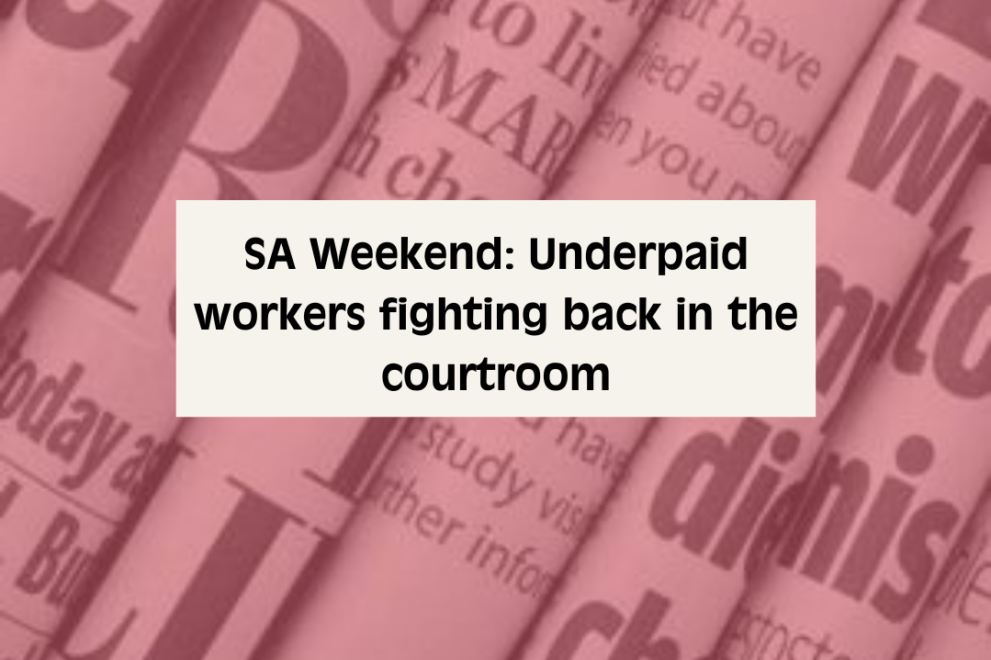
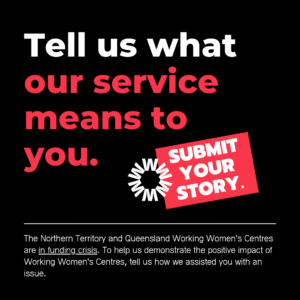

The numbers are in, and here at the South Australian Working Women’s Centre SA we have recovered $622k of stolen wages, compensation and penalties for workers in the past financial year.
That means that over the past two years, we’ve won back $1.2 million.
We are incredibly proud of all the workers that have taken a stand against injustice in the past year. With the support of our small team, they have fought for what they are owed.
Support the work that we do standing up for workers by donating to the Working Women’s Centre.
As the Women’s Safety Summit gets delayed, Working Women’s Centres have launched a fight for survival. Working Women’s Centres provide free advice, support and representation to thousands of working women every year about workplace issues.
Two out of five Australian women experienced sexual harassment at work in the past five years, but the Federal Government has failed to properly fund the Working Women’s Centres which provide a first point of contact for women experiencing sexual harassment in the workplace.
Recommendation 49 of the Respect@Work Report is that ‘Australian governments provide increased and recurrent funding to working women’s centres to provide information, advice and assistance to vulnerable workers who experience sexual harassment.
Quotes attributable to Nicki Petrou, Director of the NT Working Women’s Centre:
“Today, we are launching a fight for the survival of our specialised women’s services, services that support working women to ensure their workplaces are safe and fair. A key recommendation of the Respect@Work report was to provide increased and recurrent funding for Working Women’s Centres, but the Federal Government has not yet made any announcement of ongoing funding to the QLD and NT Working Women’s Centres.”
“With our one-off interim Federal funding running out in September, and without a further funding commitment from the Federal government, we will have to close the NT Working Women’s Centre by the end of the year. We will need to tell Territory women that we will no longer be there when things go wrong in the workplace, when they need our support.
“Whilst we are grateful for the interim funding from the Northern Territory and Federal Governments, this will not last forever and neither will we if we do not receive funding certainty soon. The time for our service is fast ticking away. We’ve been told that we needed to wait for discussions between state/territory and the federal government, for the Women’s Safety Summit in July. Discussions have been had, and the Summit has now been postponed until September., and now what? We can’t wait that long.
“The need for this funding is urgent: there has been a national outcry against workplace sexual assault that we know occurs in every industry. We cannot delay this. We cannot continue turning women away.
“To achieve safety for women in the workplace, all 55 Recommendations of the Respect@Work Report must be implemented and funded.
“Providing funding certainty to the NT Working Women’s Centre would cost less than $1 million per year. It costs less than $1 million to support women in the NT with our world leading model for tackling workplace sexual harassment and violence. How much are women in Northern Territory worth to this Governement?”
Quote attributable to Fiona Hunt, Director of Working Women Qld:
“Working Women Qld has been operating a reduced service since we lost Federal Funding in 2016. This has meant that hundreds of women in Queensland who have been treated unfairly or been sexually harassed in their workplaces have not been able to get the advice, support and representation they deserve and need to address these issues. Without the support of the Qld Government, the service would have been forced to shut down years ago. Now is the time for the Federal Government to respond to the Respect@Work recommendations and support vulnerable workers across Queensland. Working Women Qld needs Federal funding to operate a full service 5 days a week and to make sure that every woman in Queensland can be safe and equal at work.”
Quotes attributable to Abbey Kendall, Director of the Working Women’s Centre SA:
“The Working Women’s Centre SA is an example of what our service can achieve with sustainable funding. The South Australian Working Women’s Centre receives ongoing funding from both our state and federal governments. In the past two years, we recovered $1.2 million in compensation, stolen wages and penalties for workers.
“Women come to us when they are facing very complex, personal choices about how they respond to harassment in the workplace. Being armed with the facts about their options empowers them at a time when they are incredibly vulnerable. Our model of advice, education and advocacy is world leading. Funding Working Women’s Centres is an easy, immediate and tangible solution for the prevention of sexual violence.”
[End]
Save our Working Women’s Centres website:
https://saveourworkingwomenscentres.com.au/
MEDIA CONTACTS:
WWC NT Director Nicki Petrou
WWC QLD DirectorFiona Hunt
WWC SA Director Abbey Kendall
It all happened quite quickly. We arrived here as international students in February 2020, attended our orientation for two weeks, got lost on campus a few times and before we knew it, the pandemic had taken over most parts of the world and Australia closed its international borders indefinitely. No new international students would arrive, or indeed anyone who wasn’t an Australian citizen. I realized soon that I had to make the best of the situation. I missed home terribly and was concerned about my friends and family at home but could do nothing all the way from here. I decided to google all the things that I was interested in and tried to find organisations in South Australia I could get involved in, but I had no luck.
My glimmer of hope was an Ad put out by the Working Women’s Centre asking for volunteers on a project examining how young women in South Australia were impacted by COVID19. I was soon at the Centre every Monday amongst the most passionate women who were all collectively trying to improve the lives and wellbeing of women and vulnerable workers at the workplace. It was the most meaningful work I could ever have the pleasure of working on. Soon enough, we were picking up momentum by collecting more survey responses and holding consultations with international students (some of whom were my dear friends) to identify what challenges we were facing and how to make our voices heard. The result was the report titled “Loss of work, isolation & worry: the disproportionate impact of COVID-19 on young women” which was released in April, 2021.
We found that most COVID-19 related job losses occurred for part-time workers, who are disproportionately women and young people. Furthermore, international students who lost work due to COVID-19 had no access to government support like Jobkeeper or Jobseeker and had to rely on university support to make ends meet.
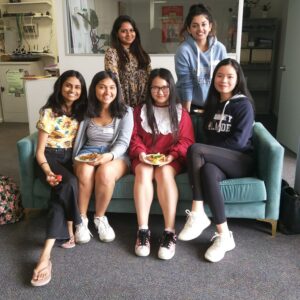
Pictured above: some of the participants from our consultation exploring the impact of the COVID19 pandemic on young women, with young international students based in South Australia.
Our consultation of female international students held in December revealed that finding a new job after losing one was one of the hardest tasks during a pandemic. In some cases, students reported a call-back rate of less than 10% when applying for jobs. Young women faced undue financial hardship as a result of this and had significant anxiety and worries over money matters. In addition to this, 44% of the survey respondents felt more discouraged about the prospect of finding work since COVID-19.
It is so difficult for young women to access safe and secure jobs, it is no wonder that we are stressed about being able to get one in the future.
This engagement with the Working Women’s Centre is what helped me get through the pandemic. It offered me a kind and supportive space to grow and learn. More importantly, I finally felt like I was part of a community that shared the same values as I did, advocating for those groups in society that often go unvoiced. If this is something you need as well, the Working Women’s Centre is the place for you.

Come along to our Feminist Action Session to help the Working Women’s Centre develop practical tools that can be used in workplaces.
1 in 3 Australians have experienced sexual harassment at work, yet only 18% of victims report their experience (according to the Respect@Work Report 2020).
The Working Women’s Centre SA has recently completed research that found that workplace posters are effective and engaging tools to highlight inappropriate behaviour and connect victims with support avenues. In the upcoming Feminist Action session, we will discuss ways in which we can combat sexual harassment in our workplaces and communities and support victims of sexual harassment. We’ll also share ideas for a meaningful poster for South Australian workplaces.
In this session you will have the opportunity to share your ideas and discuss the topic with like-minded individuals.
CONTENT NOTE: This event will involve a discussion of workplace sexual violence.
WHEN
29 Jul 2021
5.30-7.00pm
EVENT TYPE
Workshop
WHERE
The Working Women’s Centre SA, Level 1 Station Arcade, 52 Hindley Street
ACCESSIBILITY
Wheelchair Accessibility
We acknowledge that this event is on Kaurna land and we pay our respect to the traditional custodians of the land, past and present . Sovereignty was never ceded.
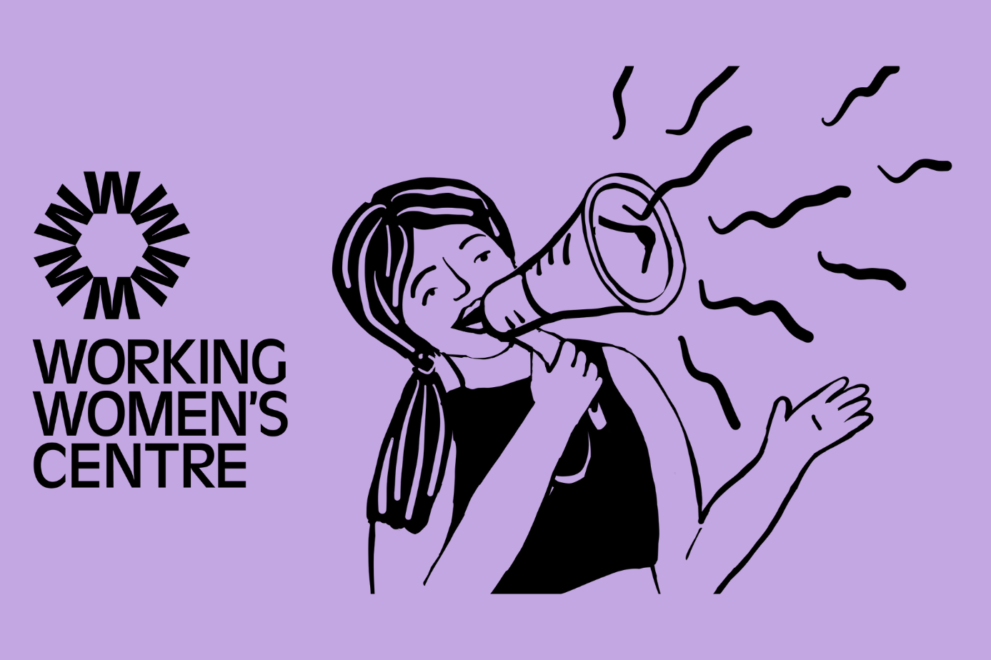
Fill out an expression of interest to volunteer here! We have a range of volunteering programs.
Fill out this form to let us know you are interested in volunteering

This story is about our fight to save the Working Women’s Centres in the NT and Queensland. It was published by The Saturday Paper on 22 May 2021.
Find the full story here.
Despite this month’s federal budget pledging $3.2 billion to women, a critical front-line service has lost much of its funding and will likely close before the end of the year.
We are pleased to announce major political parties have engaged the Working Women’s Centres to assist with workplace training. Since February, multiple political offices have contacted us to book our training ‘Preventing and Responding to Sexual Harassment’ and ‘When violence comes to work.’ This parties include:
We are pleased that political parties are taking proactive steps to prevent sexual assault in their offices by booking our training programs.
We will be working with Federal Labor and SA Labor over the next 6 months to roll out training for MPs, staff and volunteers.
Over May, the Working Women’s Centers educators travelled to Canberra to train all Federal Labor Chief of Staffs in the prevention of sexual harassment in the workplace. We are in the process of rolling out training for federal Labor offices across the country.
The Working Women’s Centre’s will also provide prevention of sexual harassment training to the Prime Minister and Cabinet department in the coming month. We have a long training relationship with the PMC team.
In South Australia, the SA Labor party passed a motion that commits to ensuring all South Australian Labor Members of Parliament, their staff, elected party officials, office bearers, campaign coordinators and campaign managers will undertake mandatory unconscious Bias training, Preventing and Addressing Sexual Harassment training and Bullying training within the next six months.
Further Senator Wong’s office has booked the suite of Working Women’s training program to be conducted in early July 2021.
We urge all states and territory governments and political parties to do the same. Leadership comes from the top.
Training programs
We encourage all political parties’ and employers to contact the Working Women’s Centres to discuss our training programs. In February 2021, after the allegations of sexual violence and harassment in Parliament House and political parties, we wrote to all political parties, their leaders in every state and territory to encourage them to take the crucial step of engaging workplace training. A previous media release about our correspondence with political parties can be found: here: https://wwcsa.org.au/call-for-all-political-parties-to-undertake-training-on-workplace-sexual-harassment/
Quotes attributable to Abbey Kendall, Director of the South Australian Working Women’s Centre.
“Workplace training is crucial to eliminating violence against women in the workplace and the community. The training must be evidence based, trauma informed and mandatory. We wrote to every political party in the country asking them to lead in this area and we are really pleased that our training programs have been taken up.“
Working Women’s Centre Training Officer Cassandra Deon-Wierda says
“Workplace training and education programs are a vital tool to improving organisational and team culture. Through action based and cooperative learning staff can become empowered and confident in their skills, knowledge, and communication with one another. As we start to gain a better understanding of the intersection of unconscious bias and serious issues within the work environment, the need for employers to maintain an inclusive environment committed to equity and respect are essential.“
Despite our crucial work, Working Women’s Centre’s in NT and QLD are in a funding crisis. We are asking the federal government to save the NT and QLD WWC and establish Working Women’s Centre’s in every state and territory in line with recommendation 49 of the Respect@Work Report. Media releases about this fight can be found here: https://wwcsa.org.au/media/media-releases/
Unless the Federal Government steps and provides ongoing and sustainable funding to the NT and QLD Working Women’s Centre, they will not be able to provide this crucial training.
In the Northern Territory –the NT Working Women’s Centre continues to receive requests for workplace training in a broad range of areas including sexual harassment, domestic and family violence and bullying. ‘All Work Aware training has a violence prevention focus. It is intended to provide safer workplaces by assisting employers/employees understand the issues and how to better respond and support workers on the ground. It is about changing the culture and making workplaces fair and safe for all, proofing your organisations against avoidable risks.’ To date, we have delivered training to a number of Government departments, not for profits and small businesses. It would be helpful if Working Women’s Centres training was available more broadly to workplaces, that we could be funded to roll this out to workplaces across Australia and not just to those who can afford it.
WWC SA Director – Abbey Kendall – 08 8410 6499 – reception@wwc.org.au
WWC NT Director – Nicki Petrou
WWC QLD Director – Fiona Hunt
The Working Women’s Centres call on the Federal Government to immediately take action and fund the Northern Territory and Queensland Working Women’s Centres.
The funding and establishment of Working Women’s Centres in every Australian state and territory is essential to addressing workplace sexual harassment, and forms a key part of the Respect@Work report, appearing at recommendation 49.
The recommendation is that ‘Australian governments provide increased and recurrent funding to working women’s centres, to provide information, advice and assistance to vulnerable workers who experience sexual harassment, taking into account particular needs of workers facing intersectional discrimination.’
The Federal Government has agreed to this recommendation in the Roadmap for Respect. However, the government has failed to provide certainty as to its funding commitment or timeframes around these discussions.
We cannot wait. The Northern Territory and Queensland WWCs have 10 weeks to find funding or face the prospect of closing. This will be devastating to working women in QLD and the NT and it will fly in the face of the federal governments promises to address gendered violence in the workplace.
The Government must act now and immediately fund the NT and QLD services. Our clients, communities and working women are depending on us. Working Women are depending on the government to save their services, who work and understand the local environment and the challenges in which they live and work.
Funding Working Women’s Centres is an easy, immediate and tangible solution for the prevention of sexual violence. This is the first test for the new Attorney General and the federal government since their response to the Report’s 55 recommendations.
Experts and leaders in gender equity regularly talk about the Working Women’s Centre holistic model as world leading. WWCs form the backbone of the fight to eliminate gendered violence in our workplaces and the community.
Director of the QLD Working Women’s Centre Fiona Hunt says: “All women deserve safe workplaces and someone to champion them when they are treated unfairly. WWC QLD works with the most vulnerable women in QLD to keep them employed, to get what they are entitled and to walk away fairly if needed.”
Director, of the NT WWC Nicki Petrou says: “In a climate when women’s safety at work has again hit the headlines, when the Federal Government has committed to building women’s workforce participation, economic security and making women’s homes and workplaces safe, funding specialist women’s services such as the Working Women’s Centres who are here now continuing to do the work, in supporting women with workplace issues and throughout COVID is especially critical. This also makes good sense.”
Director of the SA WWC Abbey Kendall says: “The South Australian WWC is a great example of what a secure and funded and working women’s center can do for workplaces, vulnerable people and working women. We make a big impact in South Australia but we need a national approach to this issue. We need an alliance of well funded Working Women’s Centres in every state and territory and the first step to achieving that is to save the NT and QLD centres”.
WWC NT Director – Nicki Petrou,
WWC QLD Director – Fiona Hunt
WWC SA Director – Abbey Kendall
The Working Women’s Centres are not-for-profit organisations which providefree advice, representation and support to vulnerable, workers about their rights at work. Additionally, the WWC’s advocate for systemic change to improve women’s workplace conditions and safety, and offer a range of free and fee for service training for workers and employers about workplace rights. This includes bullying, sexual harassment, and appropriately responding to disclosures of domestic violence.
There are currently 3 WWCs across the country (SA, NT and QLD). The only WWC with secure funding is WWC SA with the QLD service now a program of the Basic Rights Centre following non continuation of its funding 4 years earlier.
The Working Women’s Centre is made up of three arms:
Industrial/Legal support – we provide advice and representation to vulnerable workers who contact the Centre with work issues through 1:1 clinic appointments
Advocacy – we conduct advocacy to resolve systemic issues that affect women and other vulnerable workers, such as sexual harassment and precarious work
Education – we provide fee-for-service and free training for workers and employers about workplace rights. This includes bullying, sexual harassment, and appropriately responding to disclosures of domestic violence.
Core practices of the WWC
The Working Women’s Centre model is unique due to the combination of a number of core practices.
This interview was published by The Wire May 13 2021.
Listen to the full interview on The Wire here.
In a bid to repair their relationship with the women of Australia, the Federal Government is committing $3.4 billion to improving women’s safety, economic security, and health and wellbeing.
Women’s organisations say far more funds are needed to address workplace sexual harassment and violence.
Meanwhile, advocates welcome long-awaited recognition of violence against women and girls with disabilities.

This article was published by Glam Adelaide 16 March 2021.
Read the full article and see the photo on Glam Adelaide’s Website
March participants congregated at midday in Victoria Square to hear speeches before heading down to North Terrace.
Hosted by March 4 Justice, the event championed inclusion, and people of all genders were in attendance.
“The March is not just for women. It’s for everyone who wants an end to gendered violence – people from all backgrounds are welcome,” they say.
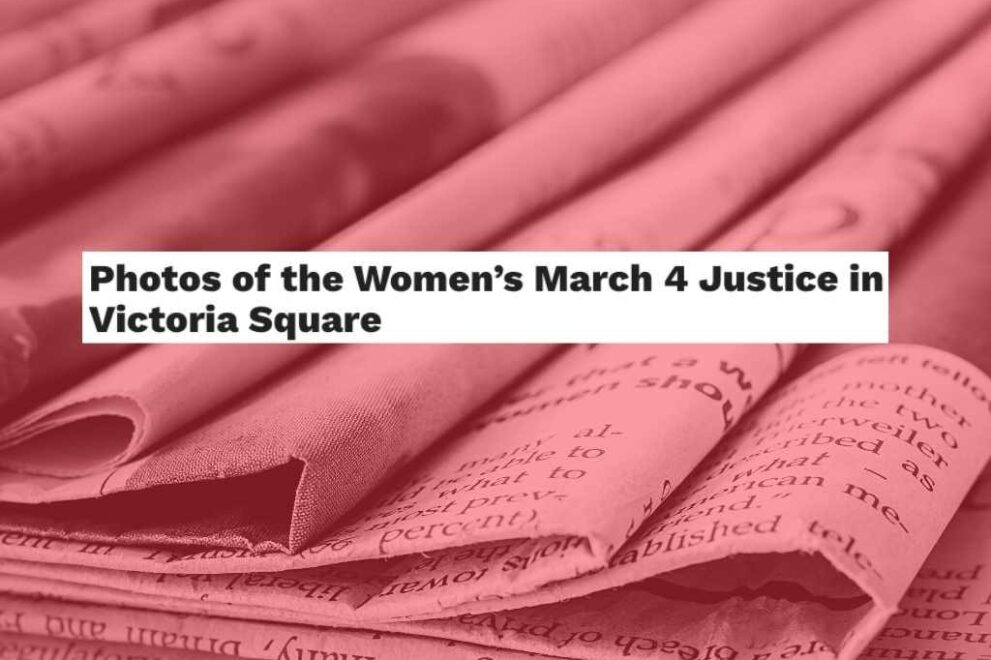
This article was published by Croaky May 12 2021.
Read the full article on Croaky’s website here
Introduction by Croakey: The “shocking global disparity” in access to vaccines remains one of the biggest risks to ending the pandemic, the World Health Organization’s Director-General warned this week.
Dr Tedros Adhanom Ghebreyesus said high and upper-middle income countries, representing 53 percent of the world’s population, have received 83 percent of the world’s vaccines.
By contrast, low and lower-middle income countries account for 47 percent of the world’s population but have received just 17 percent of the world’s vaccines.
Speaking to a media briefing on 10 May, Dr Tedros cautioned against complacency as the number of COVID-19 cases and deaths plateau globally, notwithstanding rapidly increasing cases numbers and deaths in the South-East Asia region.
“Any decline is welcome, but we have been here before,” he said. “Over the past year, many countries have experienced a declining trend in cases and deaths, have relaxed public health and social measures too quickly, and individuals have let down their guard, only for those hard-won gains to be lost.”
The WHO Foundation has launched a “Together for India” appeal to raise funds to support WHO’s work in India, including the purchase of oxygen, personal protective equipment and medicines.
Dr Tedros said the spread of variants, increased social mixing, the relaxation of public health and social measures and inequitable vaccination are all driving transmission.
“My message to leaders is, use every tool at your disposal to drive transmission down, right now,” he said.
“Even if your country has a downward trend, now is the time to surge your capacities. Even in countries with the highest vaccination rates, public health capacities must be strengthened to prepare for the possibility of vaccine-evading variants, and for future emergencies.”
Meanwhile, public health researcher Alison Barrett details some of the latest research news on COVID vaccination and useful vaccination resources in the latest edition of the COVID-19 wrap, as well as reporting on the pandemic’s impact on women.
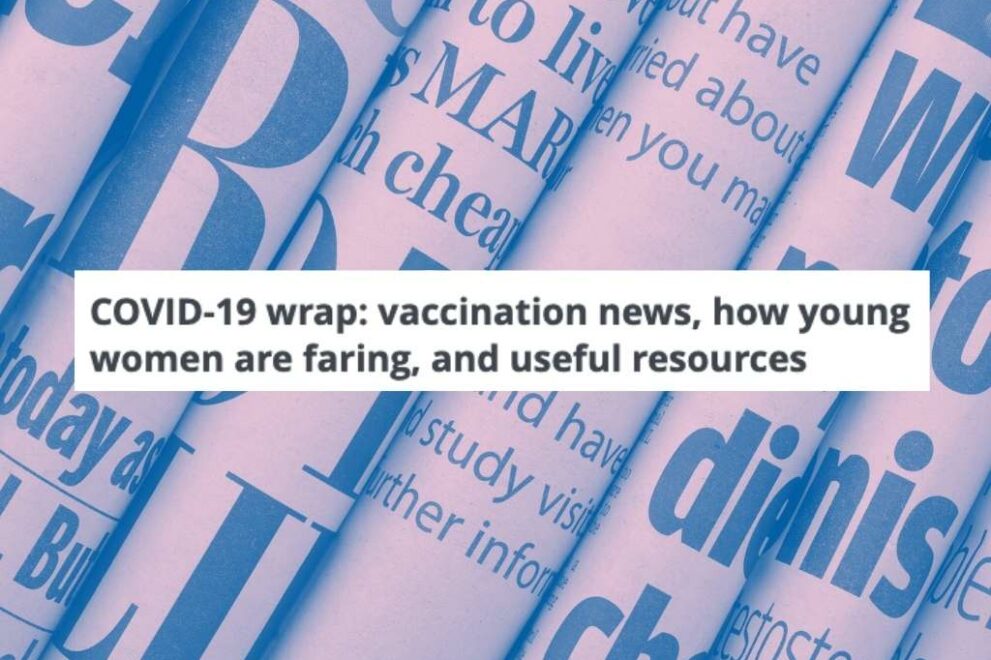
This article was published by City Mag May 10 2021.
Read the full article on CityMag’s website here
A report conducted by not-for-profit organisation Working Women’s Centre has found South Australian women were “disproportionally” impacted by the COVID-19 pandemic.
Between September 2020 and February 2021, the organisation collected written and online responses from 293 women, non-binary and genderqueer people under the age of 30. It found respondents were “hit hard” by the loss of work, increased pressure at work and home, and the mental health impacts of COVID-19.
The study revealed 44 per cent of respondents felt “discouraged” about the prospect of finding work, 48 per cent said they were “very worried” or “anxious” about money, a quarter had hours or pay reduced, and one in five lost their jobs.
This survey adds to the extensive media coverage and research conducted over the last year on how women have been disproportionately affected by the COVID-19 pandemic.
“WHAT CAN WE DO TO MAKE SURE THERE ARE BETTER OPPORTUNITIES HERE FOR SECURE WORK?”
— MADDIE SARRE
“The general mood that was conveyed to us by young women was very uncertain, and a lot of them spoke about being really worried about not being able to get work in the future,” Working Women’s Centre Youth Project Officer Maddie Sarre tells CityMag.
“Some of the main findings were that loss of work has been really huge for young women, because they are disproportionately working in a lot of the sectors that were impacted, also often employed casually, or in insecure work.
“But on the other hand, young women who are working in frontline sectors really faced increased pressure and stress. A lot of young women work in healthcare or in education, and about 40 per cent of those that responded to our survey said they were worried about getting COVID through their work, which I think takes a really big toll.”
Recently published ABS data shows women in the 20—34 age range accounted for 70 per cent of South Australia’s net female migration loss in 2019.
Although it’s been reported South Australia’s net interstate migration is at a 30-year high, the ABS data backing this claim shows South Australia is still consistently suffering a net loss in the 25—44 age range. (Though this data isn’t broken down by gender.)
Maddie says more research should be done to understand why this is occurring.
“We need to look into why are young people leaving,” she says, “and what can we do to make sure there are better opportunities here for secure work.”
Maddie says South Australia has “an opportunity right now”, as many of the young women surveyed by the Working Women’s Centre said they came back to South Australia “because of COVID”.
“It’s a real opportunity to retain those skills,” she says.
The WWC report includes four recommendations on how to improve outcomes for working women:
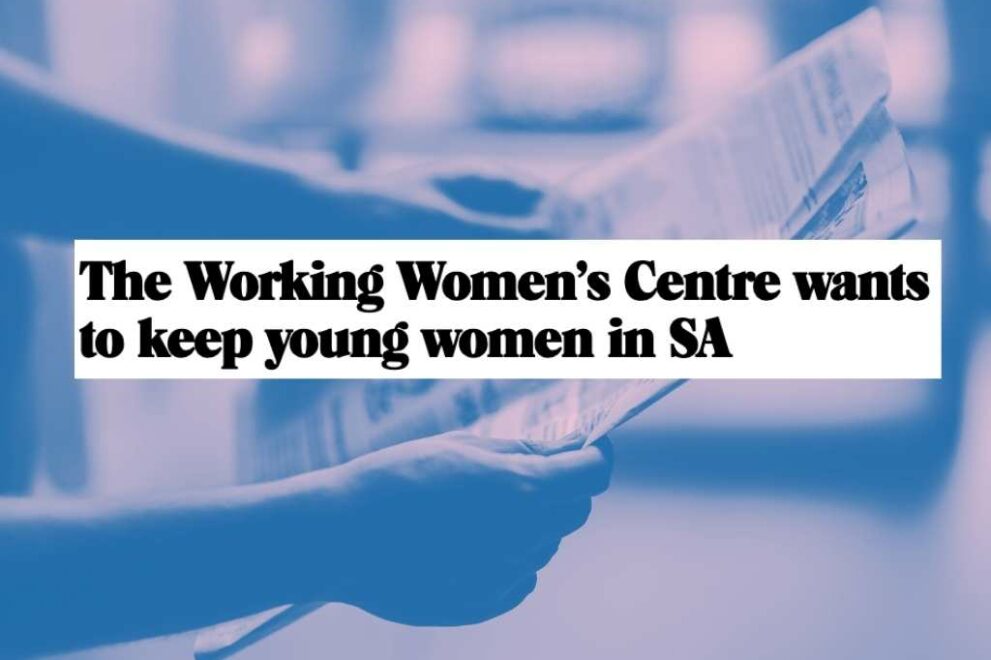
Two out of five Australian women experienced sexual harassment at work in the past five years. Despite this national crisis, Prime Minister Scott Morrison has refused to commit to funding the services that provide a first-point-of contact for women who are sexually harassed at work.
“Working Women’s Centres provide free, expert and impartial information to women about their rights and options when they are sexually harassed at work. The Queensland Working Women’s Centre was defunded by the federal government in 2016 and NT Working Women’s Centre was defunded in 2020.” said Fiona Hunt, Director of the Queensland Working Women’s Centre.
“The Respect@Work Inquiry specifically recommended that the Prime Minister do the opposite. It proposed we be funded to establish a Working Women’s Centre in every state and territory.
“We run on the smell of an oily rag, but the services we provide change women’s lives every day. Many women don’t know where to turn when they experience sexual harassment at work. They face difficult decisions and often face choosing between their safety and their livelihoods.
“The model is proven. We provide free information to women and already there is a huge unmet need. It’s absurd that we are now faced with closing the Northern Territory and Queensland Working Women’s Centres when the Respect@Work Report said we should operate in every state and territory.
“It would cost approximately $20,000,000 to properly establish and fund Working Women’s Centres in every state and territory. Given workplace sexual harassment costs the economy more than $2.6 billion per year, this is a drop in the ocean.
“We help women from all walks of life understand their rights and options. Our staff are experts in workplace law and trained in working with vulnerable clients. We also offer workplace training on preventing sexual harassment, which changes workplace culture.
“Recently, we have assisted a young woman who was working in a male dominated industry and was subject to unwanted sexual advances and touching during her probationary period. When she complained she was dismissed. We represented her to make a sexual harassment discrimination complaint, and she won substantial compensation. We receive hundreds of calls from women in similar situations who need our help,” said Fiona Hunt.
Nicki Petrou, Director of the NT Working Women’s Centre said: “In a climate when women’s safety at work has again hit the headlines, when the Federal Government has committed to building women’s workforce participation, economic security and making women’s homes and workplaces safe, funding specialist women’s services such as the Working Women’s Centres who are here now continuing to do the work, in supporting women with workplace issues and throughout COVID is especially critical. This also makes good sense, including economic sense when you look at the costs.”
“Workplace sexual harassment occurs in every industry, at every level, across every profession, in every region of Australia and cultural group. If Prime Minister Scott Morrison is genuine about acting to prevent sexual harassment he must immediately reverse the current funding situation for at risk Working Women’s Centres and invest seriously in women’s specialist services to appropriately respond to these issues.” said Nicki Petrou.
WWC NT Director – Nicki Petrou
WWC QLD Director – Fiona Hunt
WWC SA Acting Director – Nikki Candy
This article was published by ABC News Friday 30th April 5.47am 2021.
Read the full article on the ABC’s website here
A sample survey of South Australian women aged under 30 has revealed heightened anxiety and a lack of optimism about job prospects due to the global coronavirus pandemic.
Almost 300 women aged under 30 were surveyed by the Working Women’s Centre SA between September 2020 to February 2021.
More than 70 per cent of respondents said they had become “more anxious, sad or depressed” due to the pandemic, and 44 per cent said they were “discouraged” about the prospect of finding work.
“The social and economic ramifications of COVID-19 have disproportionately affected young women compared to other demographics,” the report stated.
More than half of respondents found “their way of working disrupted” and more than a quarter “had their hours or pay reduced”.
Nearly half said they were “very worried or anxious” about money.
“Between the time that SA’s first COVID-19 restrictions entered force in March 2020 and January 2021 all-male jobs had recovered, while female jobs remained well below pre-pandemic levels,” the report stated, citing Australian Bureau of Statistics data.
“This is a stark demonstration of the vulnerability of female jobs to disruption.
Working Women’s Centre youth project officer Maddie Sarre said the findings represented “a snapshot” of how young women in SA continued to be affected by coronavirus and its ongoing economic effects.
“On the other hand, those that continued to work during the pandemic faced increased pressure, through increased workloads and stress in frontline sectors such as healthcare.
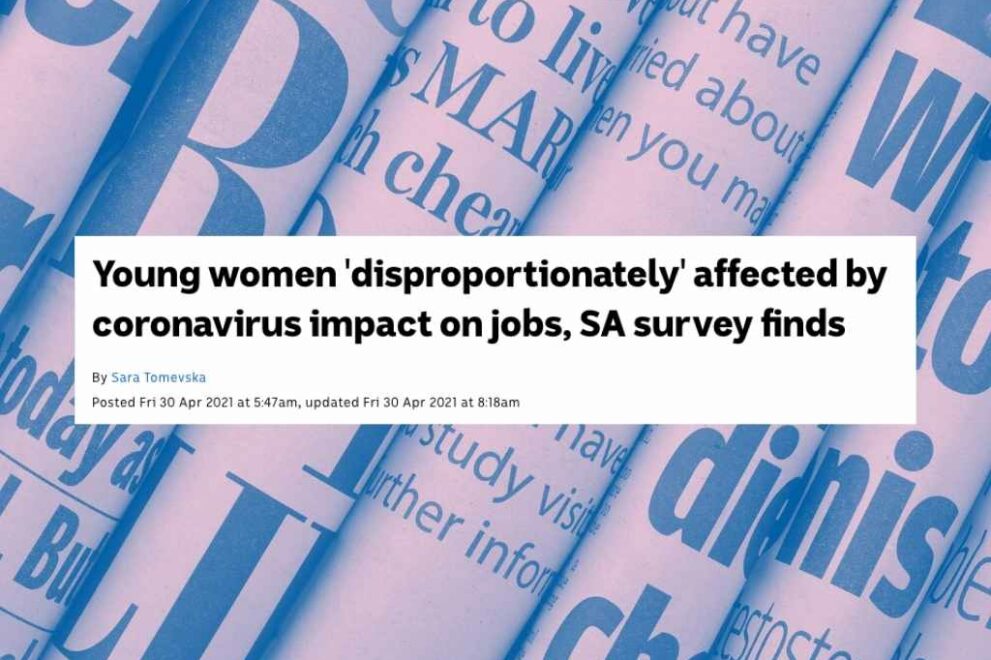
The Working Women’s Centre SA has launched a new report: Loss of work, isolation and worry: the disproportionate impact of COVID-19 on young women. The report finds that young women have been hit by loss of work, increased pressure at work and home and the mental health impacts of COVID-19.
Issues including insecure work, economy inequality and violence against women, which were exacerbated by COVID-19, position young women as the most in need of support through gender responsive COVID-19 recovery plans.
We are optimistic that the COVID-19 recovery is an opportunity for real and affective change. Our report emphasises that the creation of secure jobs in feminised sectors will improve employment for women and improve the economy through the COVID-19 recovery.
The report is a unique snapshot of the impact of COVID-19 specifically on young women in SA, looking at the combined impact of age and gender on these women’s shared experiences of the pandemic.
Please find the full report here.
For media enquiries, or to found out how you can support the recommendations, please contact Maddie at maddie@wwc.org.au
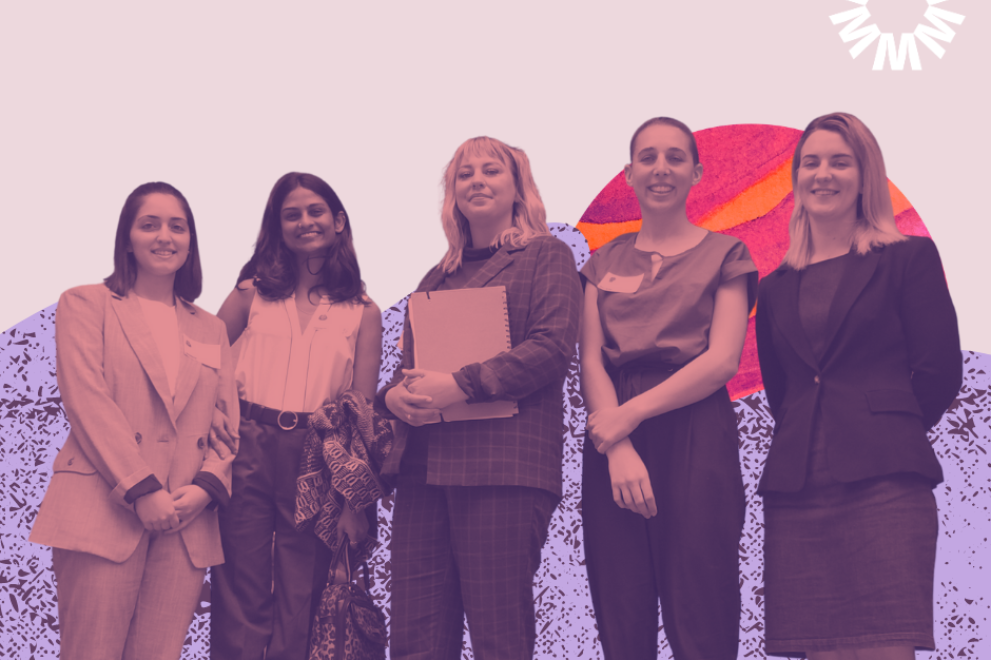
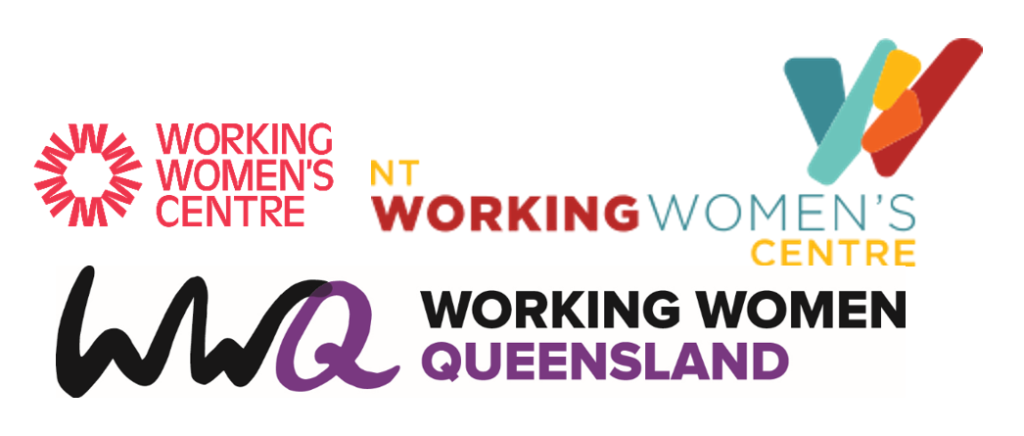
Media Statement
22 April 2021
The Working Women’s Centres call on the Federal Government to immediately take action and fund the Northern Territory and Queensland Working Women’s Centres.
The funding and establishment of Working Women’s Centres in every Australian state and territory is essential to addressing workplace sexual harassment, and forms a key part of the Respect@Work report, appearing at recommendation 49.
The recommendation is that ‘Australian governments provide increased and recurrent funding to working women’s centres, to provide information, advice and assistance to vulnerable workers who experience sexual harassment, taking into account particular needs of workers facing intersectional discrimination.’
The Federal Government has agreed to this recommendation in the Roadmap for Respect. However, the government has failed to provide certainty as to its funding commitment or timeframes around these discussions.
We cannot wait. The Northern Territory and Queensland WWCs have 10 weeks to find funding or face the prospect of closing. This will be devastating to working women in QLD and the NT and it will fly in the face of the federal governments promises to address gendered violence in the workplace.
*
The Government must act now and immediately fund the NT and QLD services. Our clients, communities and working women are depending on us. Working Women are depending on the government to save their services, who work and understand the local environment and the challenges in which they live and work.
Funding Working Women’s Centres is an easy, immediate and tangible solution for the prevention of sexual violence. This is the first test for the new Attorney General and the federal government since their response to the Report’s 55 recommendations.
Experts and leaders in gender equity regularly talk about the Working Women’s Centre holistic model as world leading. WWCs form the backbone of the fight to eliminate gendered violence in our workplaces and the community.
*
Director of the QLD Working Women’s Centre Fiona Hunt says: “All women deserve safe workplaces and someone to champion them when they are treated unfairly. WWC QLD works with the most vulnerable women in QLD to keep them employed, to get what they are entitled and to walk away fairly if needed.”
Director, of the NT WWC Nicki Petrou says: “In a climate when women’s safety at work has again hit the headlines, when the Federal Government has committed to building women’s workforce participation, economic security and making women’s homes and workplaces safe, funding specialist women’s services such as the Working Women’s Centres who are here now continuing to do the work, in supporting women with workplace issues and throughout COVID is especially critical. This also makes good sense.”
Director of the SA WWC Abbey Kendall says: “The South Australian WWC is a great example of what a secure and funded and working women’s centre can do for workplaces, vulnerable people and working women. We make a big impact in South Australia but we need a national approach to this issue. We need an alliance of well funded Working Women’s Centres in every state and territory and the first step to achieving that is to save the NT and QLD centres”.
Media contacts:
WWC NT Director – Nicki Petrou, – 08 8981 0655 - nicki@ntwwc.com.au
WWC QLD Director - Fiona Hunt, 07 3847 5532 - fionah@brq.org.au
tor Abbey Kendall, 08 8410 6499, abbey@wwc.org.au
###
Background on WWC
The Working Women’s Centres are not-for-profit organisations which providefree advice, representation and support to vulnerable, workers about their rights at work. Additionally, the WWC’s advocate for systemic change to improve women’s workplace conditions and safety, and offer a range of free and fee for service training for workers and employers about workplace rights. This includes bullying, sexual harassment, and appropriately responding to disclosures of domestic violence.
There are currently 3 WWCs across the country (SA, NT and QLD). The only WWC with secure funding is WWC SA with the QLD service now a program of the Basic Rights Centre following non continuation of its funding 4 years earlier.
The Working Women’s Centre is made up of three arms:
Industrial/Legal support – we provide advice and representation to vulnerable workers who contact the Centre with work issues through 1:1 clinic appointments
Advocacy – we conduct advocacy to resolve systemic issues that affect women and other vulnerable workers, such as sexual harassment and precarious work
This article was published by City Mag 18 March 2021.
Listen to the full interview on The Wire here.
Recent cases instigating this public action include the alleged rape of former Liberal Party staffer Brittany Higgins by a colleague, and a historical 1988 rape accusation levelled at Attorney-General Christian Porter (which he denies).
From within the crowd, CityMag saw speeches in the Square, before protesters marched to Parliament House and back. The first speaker was Kaurna and Wirangu woman Rosemary Wanganeen.
Rosemary tells the crowd colonisation and the “Western patriarchal construct” created the “greater potential” for society’s male elite “to live in privilege”.
“Those living in a society with a Western patriarchal and colonised mindset depend on us as women to fall into a rabbit warren of hopelessness, in the hope that believing is all too hard. But we’re not going to do that, are we?” Rosemary says. The crowd responds: “No”.
“We are going to keep making noise,” Rosemary continues, “and yes, we’re going to get emotional.”
CityMag speaks to a number of protesters while the speeches rage on, including a 67-year-old “survivor of sexual assault”, who we’ve chosen not to name.
She says while working in the corporate world she’d “seen a lot” in terms of sexual harassment. “Enough is enough,” she says.
In another group of protesters, we meet Barbara and Quintin McIntyre. We ask why they’re here. Barbara breaks into tears. Quintin, her husband, answers: “[Barbara] told me before that she wants things to change so her granddaughters don’t go through what she went through.
“You don’t need another review. You need things to actually change.”
Barrister Clare O’Connor also spoke at the event, saying this national effort was spurred on by the last three weeks of “disgusting information” emanating from Canberra, and government leaders need to commit to reform.
“There’s been a very, very good inquiry with 55 recommendations that came down from the Human Rights Commission. It explained how to make a workplace safe,” she says, referring to the Respect@Work report.
“We need to demand action from our politicians in relation to these things. We need to demand action in relation to those workers who are protected, those who do not have to be investigated – those parliamentarians in Canberra. Why are they above the law?”
South Australia has been in the throes of its own toxic parliamentary issues, with the publication of the Acting Equal Opportunity Commissioner’s recent report into parliament finding sexual harassment “prevalent” and “the problem and its solutions sit at an organisational and cultural level”.
The report includes 16 recommendations aiming to prevent and appropriately handle sexual and discriminatory harassment in this particular workplace, however the document reiterates sexism will only really be eliminated “through concerted efforts to create cultural change”.
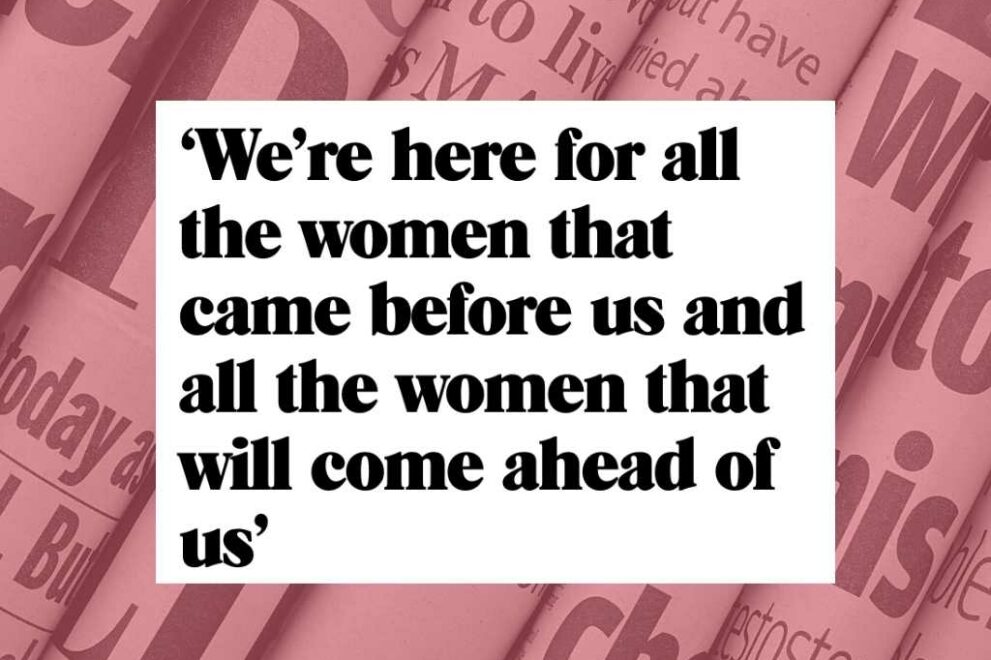
This interview was published by InDaily Monday March 15 2021
Read the full article on InDaily here.
The crowd of mostly women gathered on the steps of Victoria Square to the sound of John Farnham’s You’re The Voice with placards warning “I’m angry”, “enough is enough”, “no Porter in the house” and “we believe you Brittany”.
They then marched down King William Street towards Parliament House chanting “justice for women now” and “we will not be silenced”, before heading back to Victoria Square.
Among the protestors were SA politicians including SA Best MLC Connie Bonaros and Opposition Leader Peter Malinauskas, and human rights barrister Claire O’Connor SC.
The inaugural Adelaide March4Justice event, which started at noon, coincided with 35 protests across Australia, including in every capital city and many regional centres.
The protests supported a national march in Canberra, where a petition was delivered calling on Prime Minister Scott Morrison to act on gendered violence against women, including female Members of Parliament and staff.
The Adelaide protestors joined an estimated 100,000 people across the country calling for independent investigations into all cases of sexual harassment and assault.
South Australian protestors also called for SA Parliament to fully implement all 16 recommendations made in the Equal Opportunity Commission’s recent damning review into sexual harassment in State Parliament.
The protest’s co-organiser Dr Samantha Battams told reporters the review’s findings were not surprising.
“Women are silenced about these things – they don’t often speak up and tell their friends and family because they actually fear the consequences,” she said.
“We have already seen that with some of the national cases where women have lost their jobs.”
Barrister Claire O’Connor SC said she was the victim of violence and harassment in her workplace.
She said “every woman is here because she knows and she has experienced the pain and suffering that comes from being treated unfairly in the worksite, being treated unfairly in the home, being the victim of sexual assault and knowing that our voice doesn’t matter”.
“Enough is enough of the culture of not listening, not acting and blaming. That’s why we’re here.”
Former Federal Liberal staffer Chelsey Potter, who survived an alleged sexual assault by another former colleague in 2015, attended the Adelaide march.
She told InDaily that today was a “crucial moment for women in this country”.
“It’s actually quite emotional to feel that every woman has stood up and said ‘yeah this has happened to me’, or ‘I know someone this has happened to or you know what? I just don’t want this to happen anymore’,” she said.
“That’s an incredible thing – I’ve never actually witnessed something like this before and it’s a credit to Brittany Higgins and all the women who have stood up and said something.”
Potter said she hoped today would be “the beginning of an era where women will start calling assault and harassment out”.
Today is not the start of the social movement, but it is the start of a new notion and a new movement in Australia
She said there was was “no way” that politicians could ignore the protests happening across the country.
“They’re doing a very good job of trying to – particularly in not attending the march and I’m hoping there will be a minute to midnight change for government MPs, particularly for Coalition women to attend the march,” she said.
“I do feel like there’s no way but forward now.
“There certainly can’t be anymore ignorance on the issue, there certainly can’t be any more closed doors meetings, it has to be a conversation with women.”
The protest also heard from Kaurna and Arabunna woman Janette Milera, who organised the Black Lives Matter protest in Adelaide last year.
“Our women have been fighting the colonial white men from the day of colonisation,” she said.
“Our women have been raped, they have been taken and stolen and made as sex slaves since colonisation.
“We all need a change as women because this man’s law that we live under, it doesn’t work for any of us.”
One protestor, who InDaily has chosen not to name, held a sign that read: “Hear me rage. Justice for rape victims”.
“I’ve been raped and sexually abused four times in my life,” she said.
“I’ve reported it to police on four different occasions and… I haven’t taken it to court because of the damage it will do to me and my family.
“I haven’t been able to let out my rage and this is about me settling into my power and rage.”
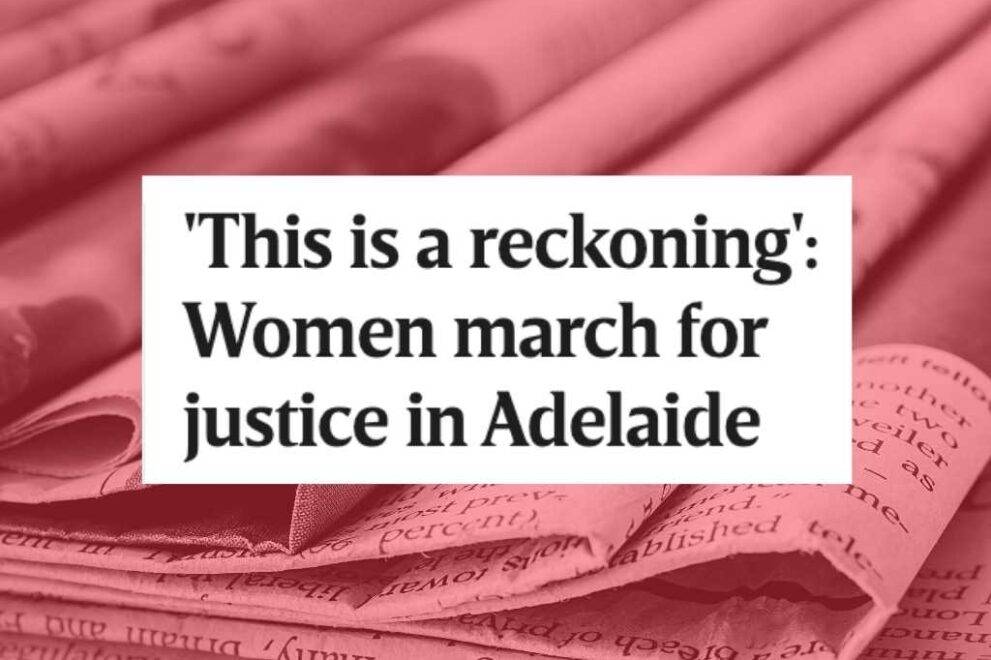
Fair Agenda & the South Australian Abortion Action Coalition are also calling for all supporters to share their own message of support with their local MP by:
Finding out where you local MP stands on the issue and sending them a message using them to vote yes to the bill to provide safe, legal and compassionate access to abortion care. Which can be done easily by using this tool: https://www.voteprochoice.org.au/
Leaving a voice mail message for your local MP, you can find a guide and talking points on how to leave a message for your MP if a staffer picks up or via voicemail message. https://fair-agenda.good.do/sadecrim/callMP/
Joining a calling party – an online get together providing a briefing and cheering on the call numbers together. 5:30-6.45pm Mon 15 Feb. Register here: https://www.fairagenda.org/sa_calling_party
The joint letter, led by Fair Agenda and South Australian Abortion Action Coalition reads:
The Working Women’s Centre SA has today written to all major political parties, urging them to commit to tackling sexual violence in their offices. The Working Women’s Centre SA Inc said that after Brittany Higgins’ story, and revelations about other sexual assaults within political offices, political parties need mandated training for their staff about preventing and responding to sexual harassment.
Today, the Working Women’s Centre sent a letter to the secretaries of the Liberal Party, the Labor Party and the Greens at a federal and South Australian state level, as well as numerous political offices, asking them to take responsibility for addressing this issue. The Working Women’s Centre SA has proposed that all political parties engage in a tailored training program that aims to prevent and safely respond to incidents of sexual violence in the workplace.
They hope to see parties make commitments to changing their workplace culture through immediate action in line with the recommendations of the Respect@Work National Inquiry Report into sexual harassment.
Abbey Kendall, Director of the Working Women’s Centre SA, said “There is something deeply wrong when the workplaces of the country’s most powerful decision-makers are failing to maintain a safe workplace and culture for women. Given the significant resources our elected representatives and their offices have, there is no excuse for failing to provide a workplace free of sexual violence. No woman should lose her job because she is assaulted.’
‘These are not the first women working in politics to come forward with stories of sexual assault. There will be more stories, from all corners of politics. The systems, the attitudes, and the culture all need to change.’
‘For us, this is not about party politics. This is about ensuring that every working woman in the country can work safely and without fear of sexual violence or harassment. Every political party in the country needs to act.’
Media contact:
Abbey Kendall
08 8410 6499
abbey@wwc.org.au
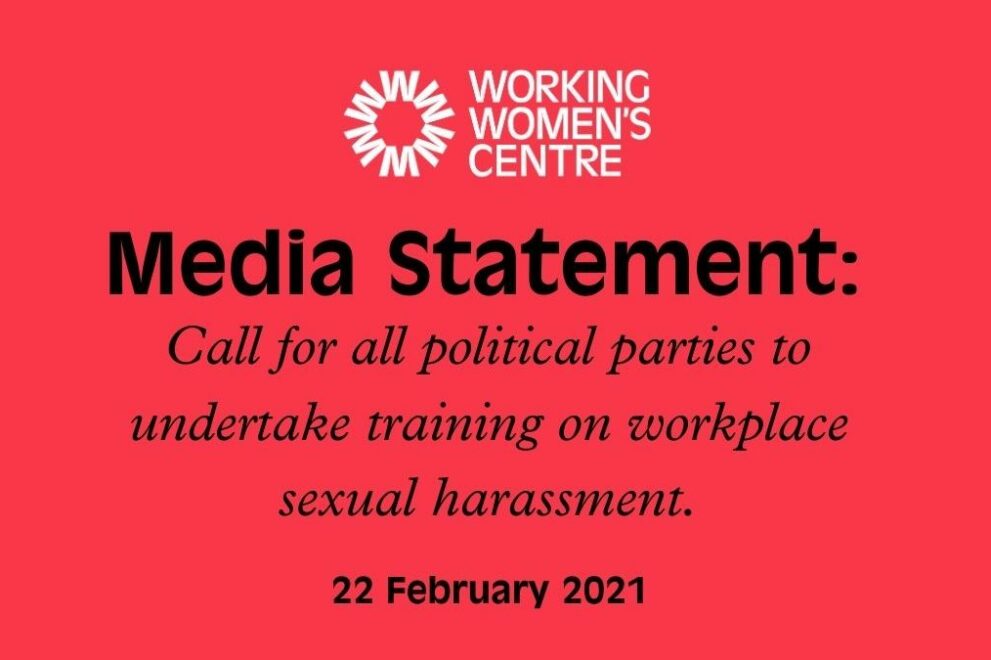
The shocking video that many people saw earlier this week is unfortunately a familiar story of wage theft and gendered workplace violence that is common in our South Australian workplaces. Now that a spotlight has been put on the issue, we have the opportunity to change things for the better.
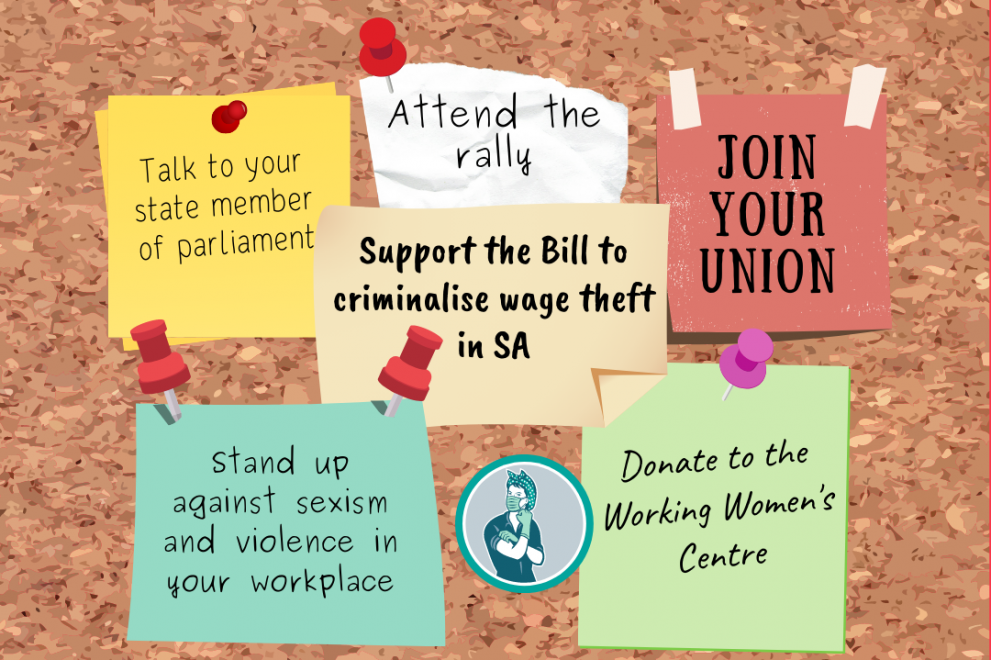
By filling out this survey between 16th December 2020 and 31st January 2021, you will go in the draw to win one of our fantastic giveaway prizes! If you would like to go in the draw, please make sure you provide us with your contact details. You will have a chance of winning:
Each winner will win one of these giveaways. By filling out the survey, you automatically go in the draw to win one of these prizes as long as you provide us with your contact details.
